:max_bytes(150000):strip_icc():format(webp)/GettyImages-962954554-5c338fc146e0fb0001346aec.jpg)
In 2024, Streamlining Audio Success Leading Podcast Hosting Options

Streamlining Audio Success: Leading Podcast Hosting Options
10 Best Podcast Hosting Platforms

Benjamin Arango
Mar 27, 2024• Proven solutions
Covering interesting topics in your podcasts or using professional audio recording and editing tools to process them, won’t mean much if you cannot reach your audience. Uploading a large numbers of audio files to your own website is not always an option, since the storage space, you have at your disposal may be too small to store all of your podcasts.
That is where podcast hosting platforms like Buzzsprout or Podbean come in, to help podcasters store their content safely and deliver their latest podcast to different apps and directories through the RSS feed.
With so many options out there, finding a podcast hosting platform can be a daunting task for podcasters who are just starting out. So, in this article, we are going to take you through the ten best podcast hosting platforms and provide you with answers to some of the most commonly asked questions about podcast hosting services.
- Part 1: Top Ten Podcast Hosting Platforms
- Part 2: Most Frequently Asked Questions about Podcast Hosting Platforms
Comparison of the Best Podcast Hosting Platforms
Are you too busy to go through all of the podcast hosting platforms we featured in this article? Do not worry, here’s a quick comparison of the best podcast hosting platforms.
| Hosting Platform | Subscription Cost | Storage | Bandwidth | Podcast Analytics | RSS Support | Website host |
|---|---|---|---|---|---|---|
| Buzzsprout | Ranges from free to $24 | Unlimited | 250 GB | Yes | Yes | Yes |
| Blubrry | Ranges from $12 to $80 per month | 100 MB | Unlimited | Yes | Yes | Yes |
| Castos | Ranges from $19 to $49 per month | Unlimited | Unlimited | Yes | Yes | Yes |
| Podbean | Ranges from free to $99 per month | Unlimited | Unlimited | Yes | Yes | Yes |
| Podiant | Ranges from $12,99 to 35,97 per month | Unlimited | Unlimited | Yes | Yes | Yes |
| Transistor.fm | Ranges from $19,00 to $99 per month | Unlimited | Unlimited | Yes | Yes | Yes |
| Simplecast | Ranges from $15 to $85 per month | Unlimited | 20,000 downloads | Yes | Yes | Yes |
| Speaker | Ranges from free to $50 per month | Varies from 5 to 1500 hours | Unlimited | Yes | Yes | No |
| Libsyn | Ranges from $5 to $150 per month | Varies between 50 MB and 80 MB | Unlimited | Yes | Yes | Yes |
| PODOMATIC | Ranges from free to $20, 82 per month | Limited, depends on the subscription model | Limited, depends on the subscription model | Yes | Yes | Yes |
Part 1: Top Ten Podcast Hosting Platforms
Building an audience for your podcast can take months, sometimes even years, and for that reason having access to a reliable hosting platform that lets you distribute new episodes of your podcast effortlessly is vital for their success. Factors that range from subscription fees to RSS support can influence your choice of a podcast hosting platform, so let’s take a look at what some of the best hosting platforms for podcasters have to offer.
1. Buzzsprout
Price: Free, pricing options start at $12 per month
The fact that over 100,000 podcasters used Buzzsprout’s services to launch their podcasts, shows how highly esteemed the platform is within the podcasting community. The episode automation feature enables you to just upload an audio file and it takes care of the ID3 tags and bitrates for you. Buzzsprout grants you access to a huge audience by allowing your subscribers to listen to your podcast from Spotify, Apple and Google Podcasts, Alexa or Overcast. The platform also provides you with advanced statistics for each episode of your podcast you upload. So, you can easily find out which apps they are using to listen to your podcasts or to learn the location at which your podcast was played.
Pros
- Unlimited storage space
- 90-day trial period
- Grants users access to most popular podcast directories
- Offers monetization options through affiliate marketing
Cons
- Bandwidth is limited to 250 GB
- The free version of Buzzsprout places ads to your podcasts on public sites
2. Blubrry
Price: Pricing options start at $12 per month
Uploading a new podcast and publishing it through Blubrry is a simple three-step process that can be completed in just a few minutes. This hosting platform grants you complete control over the iTunes’ RSS feed and it is optimized for the use on Android devices. In case you are considering moving from another platform like Libsyn or SoundCloud, you can easily migrate all of your content to Blubrry. Even though this podcast hosting platform features analytics tools you must purchase the Podcast Statistics package if you want to have a clear overview of the statistics your podcasts are generating.
Pros
- The effortless podcast publishing process
- Offers WordPress plugins
- Free and easy media migration
- Unlimited bandwidth
Cons
- Storage space depends on the subscription plan
- Access to analytics tools is not free
3. Castos
Price: Pricing options start at $19 per month
If you are searching for a platform that places no limits on your storage space or the bandwidth then you shouldn’t look much further than Castos. The platform lets you create as many new shows as you want and allows you to upload an unlimited number of episodes to each show you create. Podcasts you upload to Castos are automatically shared to all of the most popular podcast directories, including Sticher, iTunes, Spotify or Google Play. You can also transcribe all of your podcasts with a click of a button, but you must pay a small fee for each minute of the podcast you transcribe.
Pros
- Fully customizable podcast player
- Offers support for both audio and video podcasts
- Advanced analytics tools
- Grants podcasters access to all of the most popular podcast directories
Cons
- Short free trial period
- Video republishing to YouTube is only available within the Growth subscription model
4. Podbean
Price: Free, pricing options start at $9 per month
Podcasters who would like to have their own full-featured podcast website and gain access to a website builder can hardly go wrong if they opt for Podbean. Moreover, you’ll be able to use your own domain and your branding if you create an account on this hosting platform. Podbean offers a broad selection of podcast templates and lets you choose the layout. Furthermore, Podbean provides excellent monetization opportunities, either through advertising, crowdfunding or premium content. The free version of the podcast hosting platform offers only limited broadband and storage space, while video support is only available if you purchase Unlimited Plus or Business pricing plans.
Pros
- Compatible with iPhone and Android apps and embeddable media players
- Provides RSS and iTunes support
- Offers a broad selection of podcast themes
- Allows podcasters to create their own podcast sites
Cons
- You must upgrade from the free version in order to have unlimited storage and bandwidth
- Running multiple podcast channels is only possible if you have the Business pricing plan
5. Podiant
Price: Pricing plans start at $12,99
Podiant grants you access to all the tools you are going to need to upload and publish a new episode of your podcast. In fact, 22,200 podcast episodes are published through Poidant each day that are delivered to hundreds of thousands of listeners around the globe. The platform lets you choose from a broad range of themes, but it also features a templating engine that allows you to change the code on your podcasting site. Moreover, you can use Poidant to create a blog, embed content from Twitter, Instagram or YouTube in order to extend the reach of your podcasts and broaden their audience.
Pros
- Allows users to host all their shows on one website
- No bandwidth and storage space limitations
- Compatible with all major podcasting directories and apps
- Supports integrations through Zapier
Cons
- The quality of the analytics data depends on the subscription plan
- The free trial period lasts only two weeks
6. Transistor
Price: Pricing plans start at $19,00 per month
Professional podcasters and creatives from every corner of the world are already using Transistor to publish their podcasts. This podcast hosting platform makes all episodes of your podcasts available on Spotify, Overcast, and other popular podcast directories. Moreover, you can create unlimited podcasts and upload as many episodes as you want to the website you created with Transistor. The platform produces analytics reports for each of your podcasts, regardless of the pricing plan you own, but the number of collaborators on a single Transistor account depends on the subscription model. The number of monthly podcast downloads is limited and it varies from one pricing plan to another.
Pros
- Allows users to create private podcast feeds
- Supports integrations with email marketing platforms like Drip or MailChimp
- Embeddable podcast player
- The functionally organized RSS feed
Cons
- You must purchase the Business subscription model to remove the Transistor’s branding
- If you would like to create more than three private podcasts, you must contact the customer support
7. Simplecast
Price: Pricing options start at $15
The distribution, analytics, and sharing tools this podcast hosting platform provides are powerful enough to cater even for the most demanding podcasting needs. Simplecast lets you choose from a variety of themes that are optimized for mobile devices and search engines. It also enables you to customize the colors of each theme with its website builder. All podcasts you upload to Simplecast can be shared on all of the podcast directories that attract millions of listeners. What’s more, the platform makes monitoring the statistics your podcasts generate easy, so that you can discover new ways to reach new audiences.
Pros
- Websites built with Simplecast are secure
- Great selection of web-players
- Provides detailed statistics for all podcasts
- Doesn’t restrict the bandwidth or storage space
Cons
- The size of the team using Simplecast can’t exceed eight members
- Building more than three pages with Simplecast isn’t an option
8. Spreaker
Price: Free, pricing options start at $7 per month
Spreaker is an affordable podcast hosting platform for all podcasters who are just starting out or looking for a new platform they can use to host their shows. In addition, you can also stream your podcasts live, although their maximum duration depends on the subscription plan you have. The storage space you are going to have at your disposal also varies from one pricing plan to another, but even the free version of Spreaker lets you store up to five hours of audio on the cloud. However, there are no limits to the number of listeners which enables you to grow your audience continually.
Pros
- An inexpensive option for both novice and seasoned podcasters
- A fully customizable RSS feed
- Supports content migrations through RSS feed
- Provides excellent monetization options
Cons
- The storage space is limited
- You must purchase the Broadcaster subscription model in order to gain access to the platform’s analytics tools.
9. Libsyn
Price: Pricing options start at $5
This platform integrates with more than twenty podcast apps, social media platforms, and WordPress websites via the OnPublish feature. Libsyin features powerful scheduling tools, which enables you to choose the exact date and time when the next episode of your podcast is going to be published. The RSS is compliant with Apple Podcasts, which makes it easier to add a title, choose a category or write podcast summaries for each new episode you would like to optimize for playback on Apple devices. Libsyn offers Double Opt-in Advertising and MyLibSyn Premium Paywall monetization options so that you can choose the method of earning money through this podcast hosting platform that is the most convenient for you.
Pros
- Supports audio, video, text and PDF hosting
- Excellent podcast distribution capabilities
- Cheaper than most of its competitors
- Creating a publishing schedule for your podcasts is easy
Cons
- Very limited storage space, regardless of the pricing plan you purchase
- Underwhelming statistics tracking options
10. Podomatic
Price: Free, pricing options start at $8,32
The options you will have at your disposal if you opt to publish your podcasts with Podomatic, largely depends on the subscription model you have. Even though anyone can use this podcast platform for free, the bandwidth and storage space that are available on the free version of Podomatic can limit your options. Besides, publishing podcasts, you can also use the platform to listen to podcasts, from browsers or iPhone and Android devices. Podomatic lets you monetize your podcasts by connecting your Patreon account to your podcast website or by adding Podomatic Podcast to Advertise Cast.
Pros:
- Podomatic app is available for both iOS and Android devices
- Podcast published through Podomatic can be played directly from Twitter and Facebook feeds
- Equipped with a powerful drag-and-drop website builder
- Offers a variety of themes designed exclusively for podcasts
Cons
- Unlimited storage space and bandwidth are only available in the Enterprise subscription model
- Offers only basic podcast statistics
Part 2: The Most Frequently Asked Questions about Podcast Hosting Platforms
In order to add episodes of your podcasts to podcast directories, you must meet only three requirements. Your audio file must be saved in the MP3 format, you must have access to the podcast hosting platform, and you must be able to add a podcast to an RSS feed. The hosting platform you selected will utilize its RSS feed to distribute your podcasts to the apps and services your audience is using to listen to them and deliver a new episode of your show to your listeners as soon as you publish it. The reach of your podcasts, your monetization capabilities or whether or not you will be able to create custom domains depends on the podcast hosting platform you choose.
What is podcast hosting and what are its main benefits?
All podcast hosting platforms let their users store their podcasts online and create an RSS feed for them that is used to add podcast to different podcast directories. Besides sending each new episode of your podcast to your subscribers, podcast hosting platforms also enable you to track their performance and learn which apps were used to access them as well as a plethora of other relevant metrics. Some podcast hosting platforms feature website builders that allow you to create custom domain landing pages, blogs or add widgets.
Why do I need podcast hosting services?
Podcast hosting services simplify the process of storing and publishing podcasts and ensure that each new episode you publish reaches your subscribers. In addition, most platforms offer a quick and easy way to add tags, cover art or podcast descriptions, so that you can provide all the information your listeners need to find your podcasts effortlessly.
How to select the right podcast hosting platform?
The reason why you are creating a podcast can often help you figure out which podcast hosting platform is the best option for you. If you would like to periodically share short interviews or simply have fun with your friends, then choosing a free version of a podcast hosting platform is your best option.
However, if you take podcasting seriously, finding out how much storage space a platform offers or the maximum bandwidth can help you decide if the platform you are considering is the right choice for you. Moreover, podcasters who also create video podcasts should check if the platform they would like to use to distribute their podcasts supports hosting and publishing video files. Ultimately, the amount of money you are willing to spend on subscription will determine which podcast hosting platform to pick since there is no reason to spend vast amounts of money on features you have no intention of using.
Is podcast hosting free?
Even though most podcast hosting platforms either have free versions or free trial, podcast hosting over an extended period of time is never free. Each platform offers different pricing options and lets you choose the one that is best suited for your needs. If you decide to publish your podcasts with a free version of the podcast hosting platform, you should keep in mind that the scope of your options is going to be limited.
What is the average cost of podcast hosting services?
The cost of a monthly subscription for a podcast hosting service can be anywhere between $7 and $99. The majority of basic and pro pricing plans can be purchased for less than $20, but if you would like to utilize all the features a podcast hosting platform has to offer, then your monthly subscription can cost much more than a hundred dollars. Lower priced options often lack advanced file-sharing tools or don’t provide integrations features, which is the reason why you should only consider them if you just need a quick way to publish a podcast.
Conclusion
Each step of the process of creating a podcast is equally important, and the quality of the microphone you’re using to record an episode of your podcast is of no less significance than the hosting platform you’re using to publish a podcast. Each podcast hosting platform we included in this article ensures that your podcasts are delivered to all of your subscribers, but which one you are going to choose depends on a plethora of factors that range from a platform’s storage capacity to the number of podcast directories to which your podcasts are added. Which podcast hosting platform are you using to publish your podcasts? Leave a comment and let us know.

Benjamin Arango
Benjamin Arango is a writer and a lover of all things video.
Follow @Benjamin Arango
Benjamin Arango
Mar 27, 2024• Proven solutions
Covering interesting topics in your podcasts or using professional audio recording and editing tools to process them, won’t mean much if you cannot reach your audience. Uploading a large numbers of audio files to your own website is not always an option, since the storage space, you have at your disposal may be too small to store all of your podcasts.
That is where podcast hosting platforms like Buzzsprout or Podbean come in, to help podcasters store their content safely and deliver their latest podcast to different apps and directories through the RSS feed.
With so many options out there, finding a podcast hosting platform can be a daunting task for podcasters who are just starting out. So, in this article, we are going to take you through the ten best podcast hosting platforms and provide you with answers to some of the most commonly asked questions about podcast hosting services.
- Part 1: Top Ten Podcast Hosting Platforms
- Part 2: Most Frequently Asked Questions about Podcast Hosting Platforms
Comparison of the Best Podcast Hosting Platforms
Are you too busy to go through all of the podcast hosting platforms we featured in this article? Do not worry, here’s a quick comparison of the best podcast hosting platforms.
| Hosting Platform | Subscription Cost | Storage | Bandwidth | Podcast Analytics | RSS Support | Website host |
|---|---|---|---|---|---|---|
| Buzzsprout | Ranges from free to $24 | Unlimited | 250 GB | Yes | Yes | Yes |
| Blubrry | Ranges from $12 to $80 per month | 100 MB | Unlimited | Yes | Yes | Yes |
| Castos | Ranges from $19 to $49 per month | Unlimited | Unlimited | Yes | Yes | Yes |
| Podbean | Ranges from free to $99 per month | Unlimited | Unlimited | Yes | Yes | Yes |
| Podiant | Ranges from $12,99 to 35,97 per month | Unlimited | Unlimited | Yes | Yes | Yes |
| Transistor.fm | Ranges from $19,00 to $99 per month | Unlimited | Unlimited | Yes | Yes | Yes |
| Simplecast | Ranges from $15 to $85 per month | Unlimited | 20,000 downloads | Yes | Yes | Yes |
| Speaker | Ranges from free to $50 per month | Varies from 5 to 1500 hours | Unlimited | Yes | Yes | No |
| Libsyn | Ranges from $5 to $150 per month | Varies between 50 MB and 80 MB | Unlimited | Yes | Yes | Yes |
| PODOMATIC | Ranges from free to $20, 82 per month | Limited, depends on the subscription model | Limited, depends on the subscription model | Yes | Yes | Yes |
Part 1: Top Ten Podcast Hosting Platforms
Building an audience for your podcast can take months, sometimes even years, and for that reason having access to a reliable hosting platform that lets you distribute new episodes of your podcast effortlessly is vital for their success. Factors that range from subscription fees to RSS support can influence your choice of a podcast hosting platform, so let’s take a look at what some of the best hosting platforms for podcasters have to offer.
1. Buzzsprout
Price: Free, pricing options start at $12 per month
The fact that over 100,000 podcasters used Buzzsprout’s services to launch their podcasts, shows how highly esteemed the platform is within the podcasting community. The episode automation feature enables you to just upload an audio file and it takes care of the ID3 tags and bitrates for you. Buzzsprout grants you access to a huge audience by allowing your subscribers to listen to your podcast from Spotify, Apple and Google Podcasts, Alexa or Overcast. The platform also provides you with advanced statistics for each episode of your podcast you upload. So, you can easily find out which apps they are using to listen to your podcasts or to learn the location at which your podcast was played.
Pros
- Unlimited storage space
- 90-day trial period
- Grants users access to most popular podcast directories
- Offers monetization options through affiliate marketing
Cons
- Bandwidth is limited to 250 GB
- The free version of Buzzsprout places ads to your podcasts on public sites
2. Blubrry
Price: Pricing options start at $12 per month
Uploading a new podcast and publishing it through Blubrry is a simple three-step process that can be completed in just a few minutes. This hosting platform grants you complete control over the iTunes’ RSS feed and it is optimized for the use on Android devices. In case you are considering moving from another platform like Libsyn or SoundCloud, you can easily migrate all of your content to Blubrry. Even though this podcast hosting platform features analytics tools you must purchase the Podcast Statistics package if you want to have a clear overview of the statistics your podcasts are generating.
Pros
- The effortless podcast publishing process
- Offers WordPress plugins
- Free and easy media migration
- Unlimited bandwidth
Cons
- Storage space depends on the subscription plan
- Access to analytics tools is not free
3. Castos
Price: Pricing options start at $19 per month
If you are searching for a platform that places no limits on your storage space or the bandwidth then you shouldn’t look much further than Castos. The platform lets you create as many new shows as you want and allows you to upload an unlimited number of episodes to each show you create. Podcasts you upload to Castos are automatically shared to all of the most popular podcast directories, including Sticher, iTunes, Spotify or Google Play. You can also transcribe all of your podcasts with a click of a button, but you must pay a small fee for each minute of the podcast you transcribe.
Pros
- Fully customizable podcast player
- Offers support for both audio and video podcasts
- Advanced analytics tools
- Grants podcasters access to all of the most popular podcast directories
Cons
- Short free trial period
- Video republishing to YouTube is only available within the Growth subscription model
4. Podbean
Price: Free, pricing options start at $9 per month
Podcasters who would like to have their own full-featured podcast website and gain access to a website builder can hardly go wrong if they opt for Podbean. Moreover, you’ll be able to use your own domain and your branding if you create an account on this hosting platform. Podbean offers a broad selection of podcast templates and lets you choose the layout. Furthermore, Podbean provides excellent monetization opportunities, either through advertising, crowdfunding or premium content. The free version of the podcast hosting platform offers only limited broadband and storage space, while video support is only available if you purchase Unlimited Plus or Business pricing plans.
Pros
- Compatible with iPhone and Android apps and embeddable media players
- Provides RSS and iTunes support
- Offers a broad selection of podcast themes
- Allows podcasters to create their own podcast sites
Cons
- You must upgrade from the free version in order to have unlimited storage and bandwidth
- Running multiple podcast channels is only possible if you have the Business pricing plan
5. Podiant
Price: Pricing plans start at $12,99
Podiant grants you access to all the tools you are going to need to upload and publish a new episode of your podcast. In fact, 22,200 podcast episodes are published through Poidant each day that are delivered to hundreds of thousands of listeners around the globe. The platform lets you choose from a broad range of themes, but it also features a templating engine that allows you to change the code on your podcasting site. Moreover, you can use Poidant to create a blog, embed content from Twitter, Instagram or YouTube in order to extend the reach of your podcasts and broaden their audience.
Pros
- Allows users to host all their shows on one website
- No bandwidth and storage space limitations
- Compatible with all major podcasting directories and apps
- Supports integrations through Zapier
Cons
- The quality of the analytics data depends on the subscription plan
- The free trial period lasts only two weeks
6. Transistor
Price: Pricing plans start at $19,00 per month
Professional podcasters and creatives from every corner of the world are already using Transistor to publish their podcasts. This podcast hosting platform makes all episodes of your podcasts available on Spotify, Overcast, and other popular podcast directories. Moreover, you can create unlimited podcasts and upload as many episodes as you want to the website you created with Transistor. The platform produces analytics reports for each of your podcasts, regardless of the pricing plan you own, but the number of collaborators on a single Transistor account depends on the subscription model. The number of monthly podcast downloads is limited and it varies from one pricing plan to another.
Pros
- Allows users to create private podcast feeds
- Supports integrations with email marketing platforms like Drip or MailChimp
- Embeddable podcast player
- The functionally organized RSS feed
Cons
- You must purchase the Business subscription model to remove the Transistor’s branding
- If you would like to create more than three private podcasts, you must contact the customer support
7. Simplecast
Price: Pricing options start at $15
The distribution, analytics, and sharing tools this podcast hosting platform provides are powerful enough to cater even for the most demanding podcasting needs. Simplecast lets you choose from a variety of themes that are optimized for mobile devices and search engines. It also enables you to customize the colors of each theme with its website builder. All podcasts you upload to Simplecast can be shared on all of the podcast directories that attract millions of listeners. What’s more, the platform makes monitoring the statistics your podcasts generate easy, so that you can discover new ways to reach new audiences.
Pros
- Websites built with Simplecast are secure
- Great selection of web-players
- Provides detailed statistics for all podcasts
- Doesn’t restrict the bandwidth or storage space
Cons
- The size of the team using Simplecast can’t exceed eight members
- Building more than three pages with Simplecast isn’t an option
8. Spreaker
Price: Free, pricing options start at $7 per month
Spreaker is an affordable podcast hosting platform for all podcasters who are just starting out or looking for a new platform they can use to host their shows. In addition, you can also stream your podcasts live, although their maximum duration depends on the subscription plan you have. The storage space you are going to have at your disposal also varies from one pricing plan to another, but even the free version of Spreaker lets you store up to five hours of audio on the cloud. However, there are no limits to the number of listeners which enables you to grow your audience continually.
Pros
- An inexpensive option for both novice and seasoned podcasters
- A fully customizable RSS feed
- Supports content migrations through RSS feed
- Provides excellent monetization options
Cons
- The storage space is limited
- You must purchase the Broadcaster subscription model in order to gain access to the platform’s analytics tools.
9. Libsyn
Price: Pricing options start at $5
This platform integrates with more than twenty podcast apps, social media platforms, and WordPress websites via the OnPublish feature. Libsyin features powerful scheduling tools, which enables you to choose the exact date and time when the next episode of your podcast is going to be published. The RSS is compliant with Apple Podcasts, which makes it easier to add a title, choose a category or write podcast summaries for each new episode you would like to optimize for playback on Apple devices. Libsyn offers Double Opt-in Advertising and MyLibSyn Premium Paywall monetization options so that you can choose the method of earning money through this podcast hosting platform that is the most convenient for you.
Pros
- Supports audio, video, text and PDF hosting
- Excellent podcast distribution capabilities
- Cheaper than most of its competitors
- Creating a publishing schedule for your podcasts is easy
Cons
- Very limited storage space, regardless of the pricing plan you purchase
- Underwhelming statistics tracking options
10. Podomatic
Price: Free, pricing options start at $8,32
The options you will have at your disposal if you opt to publish your podcasts with Podomatic, largely depends on the subscription model you have. Even though anyone can use this podcast platform for free, the bandwidth and storage space that are available on the free version of Podomatic can limit your options. Besides, publishing podcasts, you can also use the platform to listen to podcasts, from browsers or iPhone and Android devices. Podomatic lets you monetize your podcasts by connecting your Patreon account to your podcast website or by adding Podomatic Podcast to Advertise Cast.
Pros:
- Podomatic app is available for both iOS and Android devices
- Podcast published through Podomatic can be played directly from Twitter and Facebook feeds
- Equipped with a powerful drag-and-drop website builder
- Offers a variety of themes designed exclusively for podcasts
Cons
- Unlimited storage space and bandwidth are only available in the Enterprise subscription model
- Offers only basic podcast statistics
Part 2: The Most Frequently Asked Questions about Podcast Hosting Platforms
In order to add episodes of your podcasts to podcast directories, you must meet only three requirements. Your audio file must be saved in the MP3 format, you must have access to the podcast hosting platform, and you must be able to add a podcast to an RSS feed. The hosting platform you selected will utilize its RSS feed to distribute your podcasts to the apps and services your audience is using to listen to them and deliver a new episode of your show to your listeners as soon as you publish it. The reach of your podcasts, your monetization capabilities or whether or not you will be able to create custom domains depends on the podcast hosting platform you choose.
What is podcast hosting and what are its main benefits?
All podcast hosting platforms let their users store their podcasts online and create an RSS feed for them that is used to add podcast to different podcast directories. Besides sending each new episode of your podcast to your subscribers, podcast hosting platforms also enable you to track their performance and learn which apps were used to access them as well as a plethora of other relevant metrics. Some podcast hosting platforms feature website builders that allow you to create custom domain landing pages, blogs or add widgets.
Why do I need podcast hosting services?
Podcast hosting services simplify the process of storing and publishing podcasts and ensure that each new episode you publish reaches your subscribers. In addition, most platforms offer a quick and easy way to add tags, cover art or podcast descriptions, so that you can provide all the information your listeners need to find your podcasts effortlessly.
How to select the right podcast hosting platform?
The reason why you are creating a podcast can often help you figure out which podcast hosting platform is the best option for you. If you would like to periodically share short interviews or simply have fun with your friends, then choosing a free version of a podcast hosting platform is your best option.
However, if you take podcasting seriously, finding out how much storage space a platform offers or the maximum bandwidth can help you decide if the platform you are considering is the right choice for you. Moreover, podcasters who also create video podcasts should check if the platform they would like to use to distribute their podcasts supports hosting and publishing video files. Ultimately, the amount of money you are willing to spend on subscription will determine which podcast hosting platform to pick since there is no reason to spend vast amounts of money on features you have no intention of using.
Is podcast hosting free?
Even though most podcast hosting platforms either have free versions or free trial, podcast hosting over an extended period of time is never free. Each platform offers different pricing options and lets you choose the one that is best suited for your needs. If you decide to publish your podcasts with a free version of the podcast hosting platform, you should keep in mind that the scope of your options is going to be limited.
What is the average cost of podcast hosting services?
The cost of a monthly subscription for a podcast hosting service can be anywhere between $7 and $99. The majority of basic and pro pricing plans can be purchased for less than $20, but if you would like to utilize all the features a podcast hosting platform has to offer, then your monthly subscription can cost much more than a hundred dollars. Lower priced options often lack advanced file-sharing tools or don’t provide integrations features, which is the reason why you should only consider them if you just need a quick way to publish a podcast.
Conclusion
Each step of the process of creating a podcast is equally important, and the quality of the microphone you’re using to record an episode of your podcast is of no less significance than the hosting platform you’re using to publish a podcast. Each podcast hosting platform we included in this article ensures that your podcasts are delivered to all of your subscribers, but which one you are going to choose depends on a plethora of factors that range from a platform’s storage capacity to the number of podcast directories to which your podcasts are added. Which podcast hosting platform are you using to publish your podcasts? Leave a comment and let us know.

Benjamin Arango
Benjamin Arango is a writer and a lover of all things video.
Follow @Benjamin Arango
Benjamin Arango
Mar 27, 2024• Proven solutions
Covering interesting topics in your podcasts or using professional audio recording and editing tools to process them, won’t mean much if you cannot reach your audience. Uploading a large numbers of audio files to your own website is not always an option, since the storage space, you have at your disposal may be too small to store all of your podcasts.
That is where podcast hosting platforms like Buzzsprout or Podbean come in, to help podcasters store their content safely and deliver their latest podcast to different apps and directories through the RSS feed.
With so many options out there, finding a podcast hosting platform can be a daunting task for podcasters who are just starting out. So, in this article, we are going to take you through the ten best podcast hosting platforms and provide you with answers to some of the most commonly asked questions about podcast hosting services.
- Part 1: Top Ten Podcast Hosting Platforms
- Part 2: Most Frequently Asked Questions about Podcast Hosting Platforms
Comparison of the Best Podcast Hosting Platforms
Are you too busy to go through all of the podcast hosting platforms we featured in this article? Do not worry, here’s a quick comparison of the best podcast hosting platforms.
| Hosting Platform | Subscription Cost | Storage | Bandwidth | Podcast Analytics | RSS Support | Website host |
|---|---|---|---|---|---|---|
| Buzzsprout | Ranges from free to $24 | Unlimited | 250 GB | Yes | Yes | Yes |
| Blubrry | Ranges from $12 to $80 per month | 100 MB | Unlimited | Yes | Yes | Yes |
| Castos | Ranges from $19 to $49 per month | Unlimited | Unlimited | Yes | Yes | Yes |
| Podbean | Ranges from free to $99 per month | Unlimited | Unlimited | Yes | Yes | Yes |
| Podiant | Ranges from $12,99 to 35,97 per month | Unlimited | Unlimited | Yes | Yes | Yes |
| Transistor.fm | Ranges from $19,00 to $99 per month | Unlimited | Unlimited | Yes | Yes | Yes |
| Simplecast | Ranges from $15 to $85 per month | Unlimited | 20,000 downloads | Yes | Yes | Yes |
| Speaker | Ranges from free to $50 per month | Varies from 5 to 1500 hours | Unlimited | Yes | Yes | No |
| Libsyn | Ranges from $5 to $150 per month | Varies between 50 MB and 80 MB | Unlimited | Yes | Yes | Yes |
| PODOMATIC | Ranges from free to $20, 82 per month | Limited, depends on the subscription model | Limited, depends on the subscription model | Yes | Yes | Yes |
Part 1: Top Ten Podcast Hosting Platforms
Building an audience for your podcast can take months, sometimes even years, and for that reason having access to a reliable hosting platform that lets you distribute new episodes of your podcast effortlessly is vital for their success. Factors that range from subscription fees to RSS support can influence your choice of a podcast hosting platform, so let’s take a look at what some of the best hosting platforms for podcasters have to offer.
1. Buzzsprout
Price: Free, pricing options start at $12 per month
The fact that over 100,000 podcasters used Buzzsprout’s services to launch their podcasts, shows how highly esteemed the platform is within the podcasting community. The episode automation feature enables you to just upload an audio file and it takes care of the ID3 tags and bitrates for you. Buzzsprout grants you access to a huge audience by allowing your subscribers to listen to your podcast from Spotify, Apple and Google Podcasts, Alexa or Overcast. The platform also provides you with advanced statistics for each episode of your podcast you upload. So, you can easily find out which apps they are using to listen to your podcasts or to learn the location at which your podcast was played.
Pros
- Unlimited storage space
- 90-day trial period
- Grants users access to most popular podcast directories
- Offers monetization options through affiliate marketing
Cons
- Bandwidth is limited to 250 GB
- The free version of Buzzsprout places ads to your podcasts on public sites
2. Blubrry
Price: Pricing options start at $12 per month
Uploading a new podcast and publishing it through Blubrry is a simple three-step process that can be completed in just a few minutes. This hosting platform grants you complete control over the iTunes’ RSS feed and it is optimized for the use on Android devices. In case you are considering moving from another platform like Libsyn or SoundCloud, you can easily migrate all of your content to Blubrry. Even though this podcast hosting platform features analytics tools you must purchase the Podcast Statistics package if you want to have a clear overview of the statistics your podcasts are generating.
Pros
- The effortless podcast publishing process
- Offers WordPress plugins
- Free and easy media migration
- Unlimited bandwidth
Cons
- Storage space depends on the subscription plan
- Access to analytics tools is not free
3. Castos
Price: Pricing options start at $19 per month
If you are searching for a platform that places no limits on your storage space or the bandwidth then you shouldn’t look much further than Castos. The platform lets you create as many new shows as you want and allows you to upload an unlimited number of episodes to each show you create. Podcasts you upload to Castos are automatically shared to all of the most popular podcast directories, including Sticher, iTunes, Spotify or Google Play. You can also transcribe all of your podcasts with a click of a button, but you must pay a small fee for each minute of the podcast you transcribe.
Pros
- Fully customizable podcast player
- Offers support for both audio and video podcasts
- Advanced analytics tools
- Grants podcasters access to all of the most popular podcast directories
Cons
- Short free trial period
- Video republishing to YouTube is only available within the Growth subscription model
4. Podbean
Price: Free, pricing options start at $9 per month
Podcasters who would like to have their own full-featured podcast website and gain access to a website builder can hardly go wrong if they opt for Podbean. Moreover, you’ll be able to use your own domain and your branding if you create an account on this hosting platform. Podbean offers a broad selection of podcast templates and lets you choose the layout. Furthermore, Podbean provides excellent monetization opportunities, either through advertising, crowdfunding or premium content. The free version of the podcast hosting platform offers only limited broadband and storage space, while video support is only available if you purchase Unlimited Plus or Business pricing plans.
Pros
- Compatible with iPhone and Android apps and embeddable media players
- Provides RSS and iTunes support
- Offers a broad selection of podcast themes
- Allows podcasters to create their own podcast sites
Cons
- You must upgrade from the free version in order to have unlimited storage and bandwidth
- Running multiple podcast channels is only possible if you have the Business pricing plan
5. Podiant
Price: Pricing plans start at $12,99
Podiant grants you access to all the tools you are going to need to upload and publish a new episode of your podcast. In fact, 22,200 podcast episodes are published through Poidant each day that are delivered to hundreds of thousands of listeners around the globe. The platform lets you choose from a broad range of themes, but it also features a templating engine that allows you to change the code on your podcasting site. Moreover, you can use Poidant to create a blog, embed content from Twitter, Instagram or YouTube in order to extend the reach of your podcasts and broaden their audience.
Pros
- Allows users to host all their shows on one website
- No bandwidth and storage space limitations
- Compatible with all major podcasting directories and apps
- Supports integrations through Zapier
Cons
- The quality of the analytics data depends on the subscription plan
- The free trial period lasts only two weeks
6. Transistor
Price: Pricing plans start at $19,00 per month
Professional podcasters and creatives from every corner of the world are already using Transistor to publish their podcasts. This podcast hosting platform makes all episodes of your podcasts available on Spotify, Overcast, and other popular podcast directories. Moreover, you can create unlimited podcasts and upload as many episodes as you want to the website you created with Transistor. The platform produces analytics reports for each of your podcasts, regardless of the pricing plan you own, but the number of collaborators on a single Transistor account depends on the subscription model. The number of monthly podcast downloads is limited and it varies from one pricing plan to another.
Pros
- Allows users to create private podcast feeds
- Supports integrations with email marketing platforms like Drip or MailChimp
- Embeddable podcast player
- The functionally organized RSS feed
Cons
- You must purchase the Business subscription model to remove the Transistor’s branding
- If you would like to create more than three private podcasts, you must contact the customer support
7. Simplecast
Price: Pricing options start at $15
The distribution, analytics, and sharing tools this podcast hosting platform provides are powerful enough to cater even for the most demanding podcasting needs. Simplecast lets you choose from a variety of themes that are optimized for mobile devices and search engines. It also enables you to customize the colors of each theme with its website builder. All podcasts you upload to Simplecast can be shared on all of the podcast directories that attract millions of listeners. What’s more, the platform makes monitoring the statistics your podcasts generate easy, so that you can discover new ways to reach new audiences.
Pros
- Websites built with Simplecast are secure
- Great selection of web-players
- Provides detailed statistics for all podcasts
- Doesn’t restrict the bandwidth or storage space
Cons
- The size of the team using Simplecast can’t exceed eight members
- Building more than three pages with Simplecast isn’t an option
8. Spreaker
Price: Free, pricing options start at $7 per month
Spreaker is an affordable podcast hosting platform for all podcasters who are just starting out or looking for a new platform they can use to host their shows. In addition, you can also stream your podcasts live, although their maximum duration depends on the subscription plan you have. The storage space you are going to have at your disposal also varies from one pricing plan to another, but even the free version of Spreaker lets you store up to five hours of audio on the cloud. However, there are no limits to the number of listeners which enables you to grow your audience continually.
Pros
- An inexpensive option for both novice and seasoned podcasters
- A fully customizable RSS feed
- Supports content migrations through RSS feed
- Provides excellent monetization options
Cons
- The storage space is limited
- You must purchase the Broadcaster subscription model in order to gain access to the platform’s analytics tools.
9. Libsyn
Price: Pricing options start at $5
This platform integrates with more than twenty podcast apps, social media platforms, and WordPress websites via the OnPublish feature. Libsyin features powerful scheduling tools, which enables you to choose the exact date and time when the next episode of your podcast is going to be published. The RSS is compliant with Apple Podcasts, which makes it easier to add a title, choose a category or write podcast summaries for each new episode you would like to optimize for playback on Apple devices. Libsyn offers Double Opt-in Advertising and MyLibSyn Premium Paywall monetization options so that you can choose the method of earning money through this podcast hosting platform that is the most convenient for you.
Pros
- Supports audio, video, text and PDF hosting
- Excellent podcast distribution capabilities
- Cheaper than most of its competitors
- Creating a publishing schedule for your podcasts is easy
Cons
- Very limited storage space, regardless of the pricing plan you purchase
- Underwhelming statistics tracking options
10. Podomatic
Price: Free, pricing options start at $8,32
The options you will have at your disposal if you opt to publish your podcasts with Podomatic, largely depends on the subscription model you have. Even though anyone can use this podcast platform for free, the bandwidth and storage space that are available on the free version of Podomatic can limit your options. Besides, publishing podcasts, you can also use the platform to listen to podcasts, from browsers or iPhone and Android devices. Podomatic lets you monetize your podcasts by connecting your Patreon account to your podcast website or by adding Podomatic Podcast to Advertise Cast.
Pros:
- Podomatic app is available for both iOS and Android devices
- Podcast published through Podomatic can be played directly from Twitter and Facebook feeds
- Equipped with a powerful drag-and-drop website builder
- Offers a variety of themes designed exclusively for podcasts
Cons
- Unlimited storage space and bandwidth are only available in the Enterprise subscription model
- Offers only basic podcast statistics
Part 2: The Most Frequently Asked Questions about Podcast Hosting Platforms
In order to add episodes of your podcasts to podcast directories, you must meet only three requirements. Your audio file must be saved in the MP3 format, you must have access to the podcast hosting platform, and you must be able to add a podcast to an RSS feed. The hosting platform you selected will utilize its RSS feed to distribute your podcasts to the apps and services your audience is using to listen to them and deliver a new episode of your show to your listeners as soon as you publish it. The reach of your podcasts, your monetization capabilities or whether or not you will be able to create custom domains depends on the podcast hosting platform you choose.
What is podcast hosting and what are its main benefits?
All podcast hosting platforms let their users store their podcasts online and create an RSS feed for them that is used to add podcast to different podcast directories. Besides sending each new episode of your podcast to your subscribers, podcast hosting platforms also enable you to track their performance and learn which apps were used to access them as well as a plethora of other relevant metrics. Some podcast hosting platforms feature website builders that allow you to create custom domain landing pages, blogs or add widgets.
Why do I need podcast hosting services?
Podcast hosting services simplify the process of storing and publishing podcasts and ensure that each new episode you publish reaches your subscribers. In addition, most platforms offer a quick and easy way to add tags, cover art or podcast descriptions, so that you can provide all the information your listeners need to find your podcasts effortlessly.
How to select the right podcast hosting platform?
The reason why you are creating a podcast can often help you figure out which podcast hosting platform is the best option for you. If you would like to periodically share short interviews or simply have fun with your friends, then choosing a free version of a podcast hosting platform is your best option.
However, if you take podcasting seriously, finding out how much storage space a platform offers or the maximum bandwidth can help you decide if the platform you are considering is the right choice for you. Moreover, podcasters who also create video podcasts should check if the platform they would like to use to distribute their podcasts supports hosting and publishing video files. Ultimately, the amount of money you are willing to spend on subscription will determine which podcast hosting platform to pick since there is no reason to spend vast amounts of money on features you have no intention of using.
Is podcast hosting free?
Even though most podcast hosting platforms either have free versions or free trial, podcast hosting over an extended period of time is never free. Each platform offers different pricing options and lets you choose the one that is best suited for your needs. If you decide to publish your podcasts with a free version of the podcast hosting platform, you should keep in mind that the scope of your options is going to be limited.
What is the average cost of podcast hosting services?
The cost of a monthly subscription for a podcast hosting service can be anywhere between $7 and $99. The majority of basic and pro pricing plans can be purchased for less than $20, but if you would like to utilize all the features a podcast hosting platform has to offer, then your monthly subscription can cost much more than a hundred dollars. Lower priced options often lack advanced file-sharing tools or don’t provide integrations features, which is the reason why you should only consider them if you just need a quick way to publish a podcast.
Conclusion
Each step of the process of creating a podcast is equally important, and the quality of the microphone you’re using to record an episode of your podcast is of no less significance than the hosting platform you’re using to publish a podcast. Each podcast hosting platform we included in this article ensures that your podcasts are delivered to all of your subscribers, but which one you are going to choose depends on a plethora of factors that range from a platform’s storage capacity to the number of podcast directories to which your podcasts are added. Which podcast hosting platform are you using to publish your podcasts? Leave a comment and let us know.

Benjamin Arango
Benjamin Arango is a writer and a lover of all things video.
Follow @Benjamin Arango
Benjamin Arango
Mar 27, 2024• Proven solutions
Covering interesting topics in your podcasts or using professional audio recording and editing tools to process them, won’t mean much if you cannot reach your audience. Uploading a large numbers of audio files to your own website is not always an option, since the storage space, you have at your disposal may be too small to store all of your podcasts.
That is where podcast hosting platforms like Buzzsprout or Podbean come in, to help podcasters store their content safely and deliver their latest podcast to different apps and directories through the RSS feed.
With so many options out there, finding a podcast hosting platform can be a daunting task for podcasters who are just starting out. So, in this article, we are going to take you through the ten best podcast hosting platforms and provide you with answers to some of the most commonly asked questions about podcast hosting services.
- Part 1: Top Ten Podcast Hosting Platforms
- Part 2: Most Frequently Asked Questions about Podcast Hosting Platforms
Comparison of the Best Podcast Hosting Platforms
Are you too busy to go through all of the podcast hosting platforms we featured in this article? Do not worry, here’s a quick comparison of the best podcast hosting platforms.
| Hosting Platform | Subscription Cost | Storage | Bandwidth | Podcast Analytics | RSS Support | Website host |
|---|---|---|---|---|---|---|
| Buzzsprout | Ranges from free to $24 | Unlimited | 250 GB | Yes | Yes | Yes |
| Blubrry | Ranges from $12 to $80 per month | 100 MB | Unlimited | Yes | Yes | Yes |
| Castos | Ranges from $19 to $49 per month | Unlimited | Unlimited | Yes | Yes | Yes |
| Podbean | Ranges from free to $99 per month | Unlimited | Unlimited | Yes | Yes | Yes |
| Podiant | Ranges from $12,99 to 35,97 per month | Unlimited | Unlimited | Yes | Yes | Yes |
| Transistor.fm | Ranges from $19,00 to $99 per month | Unlimited | Unlimited | Yes | Yes | Yes |
| Simplecast | Ranges from $15 to $85 per month | Unlimited | 20,000 downloads | Yes | Yes | Yes |
| Speaker | Ranges from free to $50 per month | Varies from 5 to 1500 hours | Unlimited | Yes | Yes | No |
| Libsyn | Ranges from $5 to $150 per month | Varies between 50 MB and 80 MB | Unlimited | Yes | Yes | Yes |
| PODOMATIC | Ranges from free to $20, 82 per month | Limited, depends on the subscription model | Limited, depends on the subscription model | Yes | Yes | Yes |
Part 1: Top Ten Podcast Hosting Platforms
Building an audience for your podcast can take months, sometimes even years, and for that reason having access to a reliable hosting platform that lets you distribute new episodes of your podcast effortlessly is vital for their success. Factors that range from subscription fees to RSS support can influence your choice of a podcast hosting platform, so let’s take a look at what some of the best hosting platforms for podcasters have to offer.
1. Buzzsprout
Price: Free, pricing options start at $12 per month
The fact that over 100,000 podcasters used Buzzsprout’s services to launch their podcasts, shows how highly esteemed the platform is within the podcasting community. The episode automation feature enables you to just upload an audio file and it takes care of the ID3 tags and bitrates for you. Buzzsprout grants you access to a huge audience by allowing your subscribers to listen to your podcast from Spotify, Apple and Google Podcasts, Alexa or Overcast. The platform also provides you with advanced statistics for each episode of your podcast you upload. So, you can easily find out which apps they are using to listen to your podcasts or to learn the location at which your podcast was played.
Pros
- Unlimited storage space
- 90-day trial period
- Grants users access to most popular podcast directories
- Offers monetization options through affiliate marketing
Cons
- Bandwidth is limited to 250 GB
- The free version of Buzzsprout places ads to your podcasts on public sites
2. Blubrry
Price: Pricing options start at $12 per month
Uploading a new podcast and publishing it through Blubrry is a simple three-step process that can be completed in just a few minutes. This hosting platform grants you complete control over the iTunes’ RSS feed and it is optimized for the use on Android devices. In case you are considering moving from another platform like Libsyn or SoundCloud, you can easily migrate all of your content to Blubrry. Even though this podcast hosting platform features analytics tools you must purchase the Podcast Statistics package if you want to have a clear overview of the statistics your podcasts are generating.
Pros
- The effortless podcast publishing process
- Offers WordPress plugins
- Free and easy media migration
- Unlimited bandwidth
Cons
- Storage space depends on the subscription plan
- Access to analytics tools is not free
3. Castos
Price: Pricing options start at $19 per month
If you are searching for a platform that places no limits on your storage space or the bandwidth then you shouldn’t look much further than Castos. The platform lets you create as many new shows as you want and allows you to upload an unlimited number of episodes to each show you create. Podcasts you upload to Castos are automatically shared to all of the most popular podcast directories, including Sticher, iTunes, Spotify or Google Play. You can also transcribe all of your podcasts with a click of a button, but you must pay a small fee for each minute of the podcast you transcribe.
Pros
- Fully customizable podcast player
- Offers support for both audio and video podcasts
- Advanced analytics tools
- Grants podcasters access to all of the most popular podcast directories
Cons
- Short free trial period
- Video republishing to YouTube is only available within the Growth subscription model
4. Podbean
Price: Free, pricing options start at $9 per month
Podcasters who would like to have their own full-featured podcast website and gain access to a website builder can hardly go wrong if they opt for Podbean. Moreover, you’ll be able to use your own domain and your branding if you create an account on this hosting platform. Podbean offers a broad selection of podcast templates and lets you choose the layout. Furthermore, Podbean provides excellent monetization opportunities, either through advertising, crowdfunding or premium content. The free version of the podcast hosting platform offers only limited broadband and storage space, while video support is only available if you purchase Unlimited Plus or Business pricing plans.
Pros
- Compatible with iPhone and Android apps and embeddable media players
- Provides RSS and iTunes support
- Offers a broad selection of podcast themes
- Allows podcasters to create their own podcast sites
Cons
- You must upgrade from the free version in order to have unlimited storage and bandwidth
- Running multiple podcast channels is only possible if you have the Business pricing plan
5. Podiant
Price: Pricing plans start at $12,99
Podiant grants you access to all the tools you are going to need to upload and publish a new episode of your podcast. In fact, 22,200 podcast episodes are published through Poidant each day that are delivered to hundreds of thousands of listeners around the globe. The platform lets you choose from a broad range of themes, but it also features a templating engine that allows you to change the code on your podcasting site. Moreover, you can use Poidant to create a blog, embed content from Twitter, Instagram or YouTube in order to extend the reach of your podcasts and broaden their audience.
Pros
- Allows users to host all their shows on one website
- No bandwidth and storage space limitations
- Compatible with all major podcasting directories and apps
- Supports integrations through Zapier
Cons
- The quality of the analytics data depends on the subscription plan
- The free trial period lasts only two weeks
6. Transistor
Price: Pricing plans start at $19,00 per month
Professional podcasters and creatives from every corner of the world are already using Transistor to publish their podcasts. This podcast hosting platform makes all episodes of your podcasts available on Spotify, Overcast, and other popular podcast directories. Moreover, you can create unlimited podcasts and upload as many episodes as you want to the website you created with Transistor. The platform produces analytics reports for each of your podcasts, regardless of the pricing plan you own, but the number of collaborators on a single Transistor account depends on the subscription model. The number of monthly podcast downloads is limited and it varies from one pricing plan to another.
Pros
- Allows users to create private podcast feeds
- Supports integrations with email marketing platforms like Drip or MailChimp
- Embeddable podcast player
- The functionally organized RSS feed
Cons
- You must purchase the Business subscription model to remove the Transistor’s branding
- If you would like to create more than three private podcasts, you must contact the customer support
7. Simplecast
Price: Pricing options start at $15
The distribution, analytics, and sharing tools this podcast hosting platform provides are powerful enough to cater even for the most demanding podcasting needs. Simplecast lets you choose from a variety of themes that are optimized for mobile devices and search engines. It also enables you to customize the colors of each theme with its website builder. All podcasts you upload to Simplecast can be shared on all of the podcast directories that attract millions of listeners. What’s more, the platform makes monitoring the statistics your podcasts generate easy, so that you can discover new ways to reach new audiences.
Pros
- Websites built with Simplecast are secure
- Great selection of web-players
- Provides detailed statistics for all podcasts
- Doesn’t restrict the bandwidth or storage space
Cons
- The size of the team using Simplecast can’t exceed eight members
- Building more than three pages with Simplecast isn’t an option
8. Spreaker
Price: Free, pricing options start at $7 per month
Spreaker is an affordable podcast hosting platform for all podcasters who are just starting out or looking for a new platform they can use to host their shows. In addition, you can also stream your podcasts live, although their maximum duration depends on the subscription plan you have. The storage space you are going to have at your disposal also varies from one pricing plan to another, but even the free version of Spreaker lets you store up to five hours of audio on the cloud. However, there are no limits to the number of listeners which enables you to grow your audience continually.
Pros
- An inexpensive option for both novice and seasoned podcasters
- A fully customizable RSS feed
- Supports content migrations through RSS feed
- Provides excellent monetization options
Cons
- The storage space is limited
- You must purchase the Broadcaster subscription model in order to gain access to the platform’s analytics tools.
9. Libsyn
Price: Pricing options start at $5
This platform integrates with more than twenty podcast apps, social media platforms, and WordPress websites via the OnPublish feature. Libsyin features powerful scheduling tools, which enables you to choose the exact date and time when the next episode of your podcast is going to be published. The RSS is compliant with Apple Podcasts, which makes it easier to add a title, choose a category or write podcast summaries for each new episode you would like to optimize for playback on Apple devices. Libsyn offers Double Opt-in Advertising and MyLibSyn Premium Paywall monetization options so that you can choose the method of earning money through this podcast hosting platform that is the most convenient for you.
Pros
- Supports audio, video, text and PDF hosting
- Excellent podcast distribution capabilities
- Cheaper than most of its competitors
- Creating a publishing schedule for your podcasts is easy
Cons
- Very limited storage space, regardless of the pricing plan you purchase
- Underwhelming statistics tracking options
10. Podomatic
Price: Free, pricing options start at $8,32
The options you will have at your disposal if you opt to publish your podcasts with Podomatic, largely depends on the subscription model you have. Even though anyone can use this podcast platform for free, the bandwidth and storage space that are available on the free version of Podomatic can limit your options. Besides, publishing podcasts, you can also use the platform to listen to podcasts, from browsers or iPhone and Android devices. Podomatic lets you monetize your podcasts by connecting your Patreon account to your podcast website or by adding Podomatic Podcast to Advertise Cast.
Pros:
- Podomatic app is available for both iOS and Android devices
- Podcast published through Podomatic can be played directly from Twitter and Facebook feeds
- Equipped with a powerful drag-and-drop website builder
- Offers a variety of themes designed exclusively for podcasts
Cons
- Unlimited storage space and bandwidth are only available in the Enterprise subscription model
- Offers only basic podcast statistics
Part 2: The Most Frequently Asked Questions about Podcast Hosting Platforms
In order to add episodes of your podcasts to podcast directories, you must meet only three requirements. Your audio file must be saved in the MP3 format, you must have access to the podcast hosting platform, and you must be able to add a podcast to an RSS feed. The hosting platform you selected will utilize its RSS feed to distribute your podcasts to the apps and services your audience is using to listen to them and deliver a new episode of your show to your listeners as soon as you publish it. The reach of your podcasts, your monetization capabilities or whether or not you will be able to create custom domains depends on the podcast hosting platform you choose.
What is podcast hosting and what are its main benefits?
All podcast hosting platforms let their users store their podcasts online and create an RSS feed for them that is used to add podcast to different podcast directories. Besides sending each new episode of your podcast to your subscribers, podcast hosting platforms also enable you to track their performance and learn which apps were used to access them as well as a plethora of other relevant metrics. Some podcast hosting platforms feature website builders that allow you to create custom domain landing pages, blogs or add widgets.
Why do I need podcast hosting services?
Podcast hosting services simplify the process of storing and publishing podcasts and ensure that each new episode you publish reaches your subscribers. In addition, most platforms offer a quick and easy way to add tags, cover art or podcast descriptions, so that you can provide all the information your listeners need to find your podcasts effortlessly.
How to select the right podcast hosting platform?
The reason why you are creating a podcast can often help you figure out which podcast hosting platform is the best option for you. If you would like to periodically share short interviews or simply have fun with your friends, then choosing a free version of a podcast hosting platform is your best option.
However, if you take podcasting seriously, finding out how much storage space a platform offers or the maximum bandwidth can help you decide if the platform you are considering is the right choice for you. Moreover, podcasters who also create video podcasts should check if the platform they would like to use to distribute their podcasts supports hosting and publishing video files. Ultimately, the amount of money you are willing to spend on subscription will determine which podcast hosting platform to pick since there is no reason to spend vast amounts of money on features you have no intention of using.
Is podcast hosting free?
Even though most podcast hosting platforms either have free versions or free trial, podcast hosting over an extended period of time is never free. Each platform offers different pricing options and lets you choose the one that is best suited for your needs. If you decide to publish your podcasts with a free version of the podcast hosting platform, you should keep in mind that the scope of your options is going to be limited.
What is the average cost of podcast hosting services?
The cost of a monthly subscription for a podcast hosting service can be anywhere between $7 and $99. The majority of basic and pro pricing plans can be purchased for less than $20, but if you would like to utilize all the features a podcast hosting platform has to offer, then your monthly subscription can cost much more than a hundred dollars. Lower priced options often lack advanced file-sharing tools or don’t provide integrations features, which is the reason why you should only consider them if you just need a quick way to publish a podcast.
Conclusion
Each step of the process of creating a podcast is equally important, and the quality of the microphone you’re using to record an episode of your podcast is of no less significance than the hosting platform you’re using to publish a podcast. Each podcast hosting platform we included in this article ensures that your podcasts are delivered to all of your subscribers, but which one you are going to choose depends on a plethora of factors that range from a platform’s storage capacity to the number of podcast directories to which your podcasts are added. Which podcast hosting platform are you using to publish your podcasts? Leave a comment and let us know.

Benjamin Arango
Benjamin Arango is a writer and a lover of all things video.
Follow @Benjamin Arango
Bridging Audio Realms to the Screen: Designing Eye-Catching Audio Graphs & Animating Video Sequences with Premiere Pro Mastery
By using waveform of the sound waves in Premiere Pro, we can better edit audio. In the following article, we’ll learn how the audio waveform auto-sync feature in Premiere Pro helps automatically align and merge clips in the Project panel, in the timeline, and when setting up a multicamera project and how to insert audio waveform on your clips using Premiere Pro.
Part 1. How to show Audio Waveform on clips in Premiere Pro? (2 ways)
Users frequently complain that the audio waveform can suddenly disappear while editing audio in Premiere Pro, which is quite annoying to deal with. In the following tutorial, I’m going to show you how to make the audio waveforms visible.
1. Click the wrench icon on settings button
If you are not seeing them on audio clips on your timeline, then you drag on an audio clip to your timeline or your sequence and just click on the wrench and check to show audio waveform.
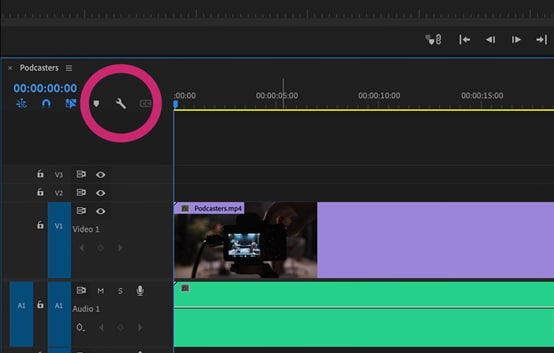
Once you check that you should see the audio waveforms on your clip you can click it again you should see a checkmark and it is highlighted in blue and if you don’t want to see them all you have to do is click it again.
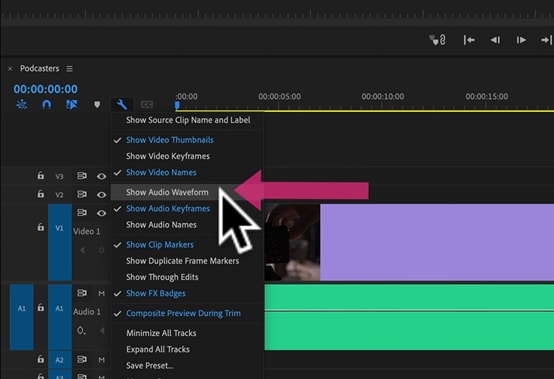
That will toggle off the audio waveforms and that is how to show the audio waveforms on your audio clips in adobe premiere pro.
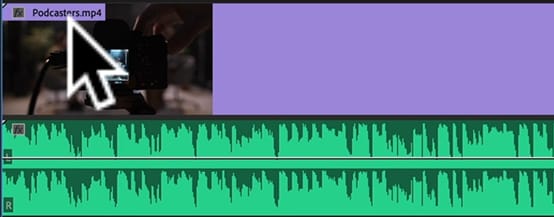
2. Automatic generate audio waveform
Make sure “Automatic audio waveform creation” is selected by going to “Edit > Preferences > Audio” first. When importing files, no waveforms are generated if option is unticked. Only clips you import moving forward will be impacted by this; clips already imported won’t be affected.
Second, for creating audio waveforms on clips that don’t have them, select the clips in the Program panel and go to “Clip > Generate Audio Waveform”.
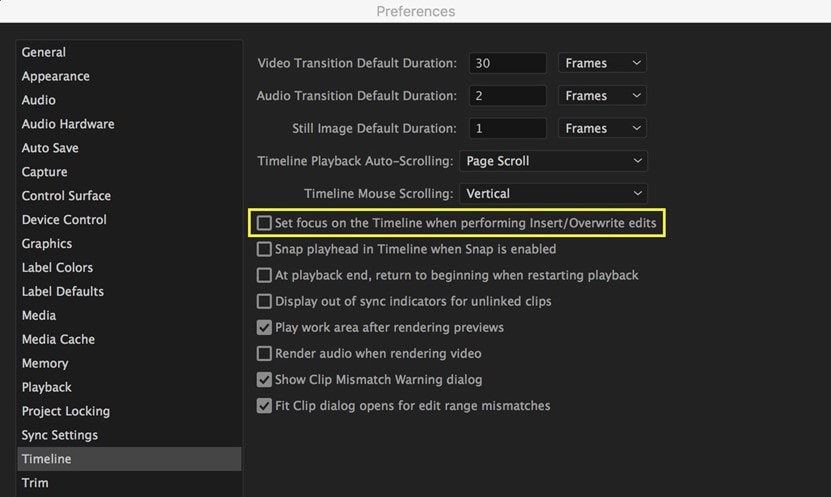
Part 2. How to add audio waveform animation in Premiere Pro?
If you want to simply add a dynamic effect to your audio, just follow the tutorial below.
Step1Click After Effects Composition
First, make sure both the video and audio are selected. Right-click and select replace with After Effects composition.
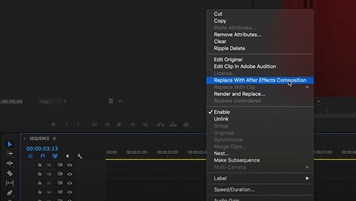
Step2Create a new solid in After Effects
After creating a new project in After Effects, you need to choose a new solid of any color in your composition.
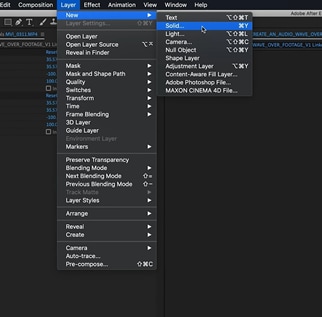
Step3Open audio waveform effect
Search audio waveform and drag and drop this effect on your solid. The waveform will now respond to the audio in your film if you use the audio layer option for your clip in the effect parameters for your solid change.
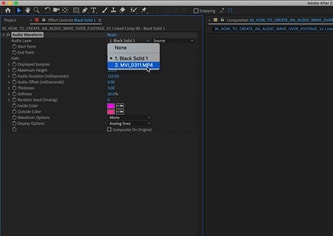
Step4Adjust the audio waveform effect
The position of the waveform on your video can be changed by utilizing the start and end point settings. Make sure the last values for each selections are the same to maintain an even level. Next, you can change the characteristics to give your waveform the desired appearance. Here, I applied some fundamental settings that are effective for singing. Using the two-color picker options and the display options, you may also change the waveform’s inner and outer colors.
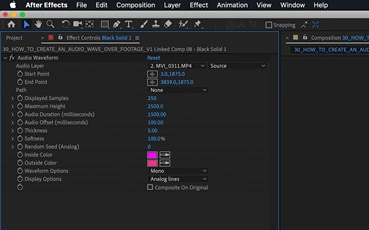
Step5Check the animation and export the video
Back in Premiere, you can pick whether you want the traditional analog lines to appear or a more contemporary digital waveform. Your clip will now be replaced with an After Effects composition that is dynamically tied to the audio waveform.
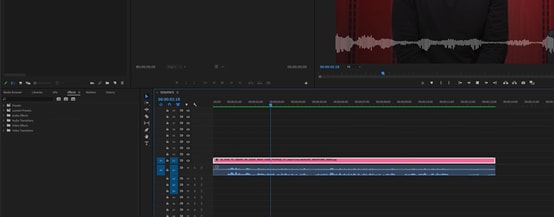
Part 3. How to change the incorrect audio waveform in Premiere Pro?
These problems typically result from corrupted cache/peak files. If you have cleared the cache from the application. I will recommend cleaning them manually by going to the location specified in “Preferences > Media Cache”.
Clean the contents of the folder named Media Cache, Media Cache files, and Peak files (Before cleaning them, please ensure to open these folders once and verify if they have any of the media files in them to avoid any accidental deletion of required media or asset).
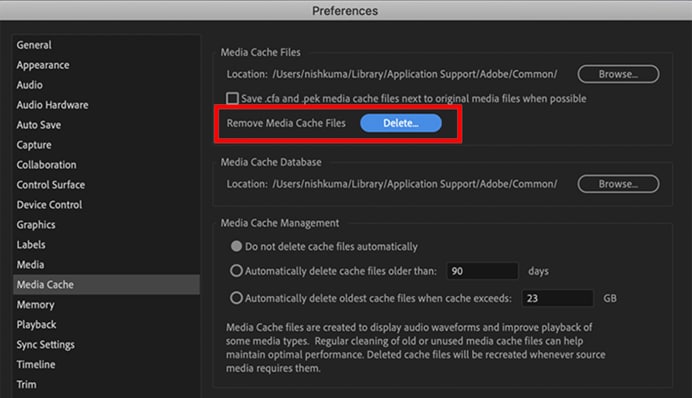
Please make sure that the option “Save.cfa and.pek cache files next to the original media files when possible” is unchecked. If it is ticked, you will have to remove them by hand from the folders where the media files are kept.
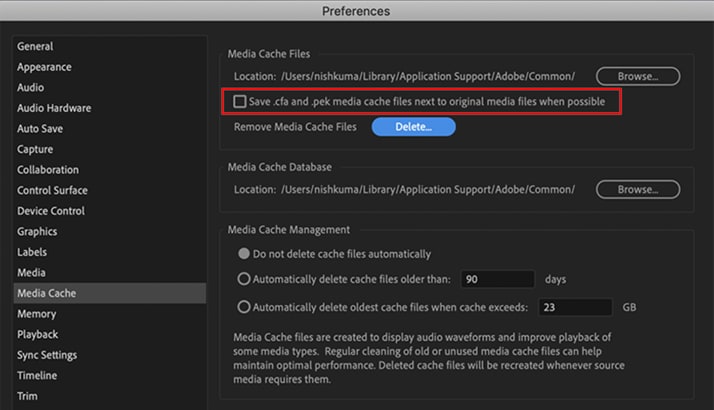
The Audio previews can also be cleaned (File > Project Settings > Scratch Disks > Audio Previews).
The following time you open the project, these files will be cleared. Rebuilding the necessary cache and peak files could take some time.
Part 4. How to add audio waveform animation to video with Premiere Pro alternative?
In reality, based on the above process, it is clear that you must use After Effects to add audio waveform animation effects in Premiere Pro. Although you can further modify the animation, this approach is very difficult for beginners to understand, and it has a high learning cost. In this situation, we strongly advise you to try Filmora Audio Visualizer . We provide more than 25 animation effects and fixed pre-made waveform elements, and you can also adjust the color and frequency in Advanced Settings. Come and give it a try!
Conclusion
This article will help you in resolving various audio waveform issues in Premiere Pro. Additionally, you can discover how to create waveforms in your audio clips. You should try Wondershare Filmora to add the waveform animation even if Premiere Pro is one of the greatest audio and video editing programs. Beginners will find it more convenient and simpler. If you simply want to quickly polish your music video or podcast video, the Filmora audio visualizer is a better option.
Free Download For Win 7 or later(64-bit)
Free Download For macOS 10.14 or later
Conclusion
This article will help you in resolving various audio waveform issues in Premiere Pro. Additionally, you can discover how to create waveforms in your audio clips. You should try Wondershare Filmora to add the waveform animation even if Premiere Pro is one of the greatest audio and video editing programs. Beginners will find it more convenient and simpler. If you simply want to quickly polish your music video or podcast video, the Filmora audio visualizer is a better option.
Free Download For Win 7 or later(64-bit)
Free Download For macOS 10.14 or later
Elevating Your Podcast’s Ambiance: A Guide to Locating Sound Effects
When people hear podcasting, they assume that it involves long speeches, but it is not so. For many creators, the concern for how to write podcast scripts that attract listeners involves adding sound effects. Doing so improves the quality of the audio content and appeals to listeners.
The dynamic sound effects for podcasts can help highlight specific moments/reactions/information, add to the atmospheric feel of the show, or prepare a unique intro tune. Different tools are useful for inserting the best sound effects into such shows. Let’s learn which ones they are and how they work.
Benefits of Adding Sound Effects in Podcasts
Before discussing what tools can help editors add sound effects to podcast episodes, we should refresh on why it is vital. Here are some of the best benefits you can expect from inserting sound effects for podcasts:
- Thematic or mood setting
With a sound effect, you can portray a specific theme for your podcast that gives the users an instant feel of your brand/channel. For example, if a podcaster is creating a podcast show for the True Crime genre, spooky and moody background sound effects set the mood. Comedy or commentary podcasts can use mood-based sound effects like a laugh track with their content.
- Point emphasis
Many podcasters utilize sound effects at pivotal moments of their content, e.g., to emphasize a cliffhanger in story-form podcast episodes. Like the boding and italicizing methods are useful in text documents to emphasize parts, you can adjust sound effects to do the same for your audio-based content. These can accentuate the dialogue and evoke specific emotional responses from the audience.
- Transition points
Most podcasters utilize the best sound effects for podcast shows to act as a transition between conversational segments. For example, some use these effects as outros or intros.
Now that you are clear about the expected benefits, which platform should you turn to for many quality sound effects? Here are some of the best solutions you can trust, starting with the most useful- Filmora.
1.Wondershare Filmora [Most Recommended Platform]
If you want the best sound effects for podcast episodes, Wondershare Filmora is one notable solution to try out. You can use this software to record your audio, trim it, and add royalty-free sound effects in - all in one editor.
Free Download For Win 7 or later(64-bit)
Free Download For macOS 10.14 or later
Users can utilize Filmora to further enhance the sound quality using audio editing features like Denoise and Equalizer. Remove long silent parts with the Silence Detection mechanism, and sync the beats with voiceover using Auto Beat Sync. Plus, it has a simple UI with drag-and-drop functionality for an easier method of adding effects to specific sections.
Top Features to Try for Podcasters on Filmora:
- Optimize sound quality with audio editing tools like silence detection, audio synchronization, etc.
- Make your narration clear-sounding using the one-click Audio Ducking feature.
- Add AI-made voiceover if you want to avoid using your voice by adding text into the Text-to-Speech feature, which produces accurate voice narration.
- Utilize Speech-to-Text to transcribe your speech into text format in different languages, and add subtitles for your global listeners to read if you add a video version.
How to add Sound and Edit your Voiceovers for Podcasts with Filmora?
Step1 Download and launch the Wondershare Filmora 11 software on your PC or Mac device.
Step2 Plug a stable microphone you will use on the computer when you start. For the best voice quality during recording, it is best to utilize a high-grade external microphone model for professional-level sound capture.
Step3 Access the Filmora software after you launch it beforehand. On the homepage, click on the New Project option.
Step4 When the editor program opens, tap on the drop-down menu below the top-most toolbar for Record. From the options, select the “Record a Voiceover” choice.
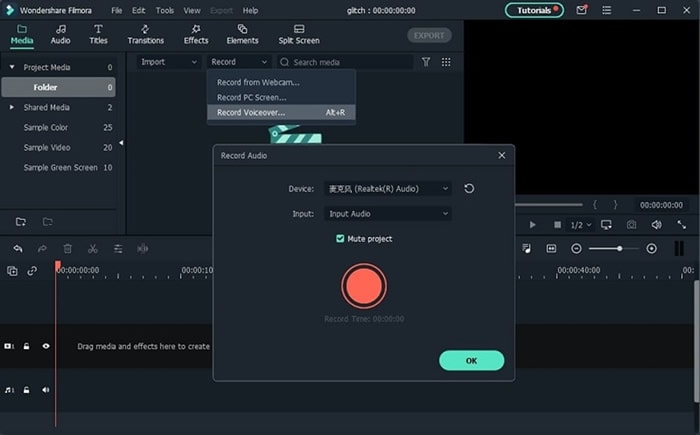
Step5 The recording pop-up window will open. Click on the big red record button after the input microphone/speaker settings, and start speaking. When you are done, click the square red stop button. Press OK to save.
Alternatively, you can click on the Microphone icon. Please wait 3 seconds and then start speaking into the microphone and click it again after you are done speaking. The newly recorded file will automatically come in the audio track timeline.
Step6 Click the audio track in the timeline. Among the settings, make changes as you prefer in Pitch, Volume, and Speed. Cut the sections of your voiceover recording you want to remove and add fade-in/fade-out effects. After making all changes, click OK.
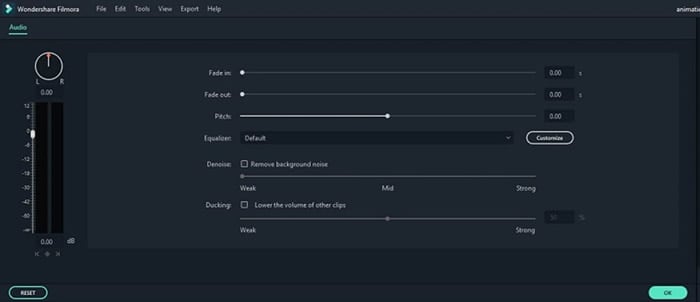
Step7 If you have the recording of the narration already available in other locations, like your phone or device, import it into the software.
Step8 Add transitions, effects, and titles from the respective tabs on the top toolbar.
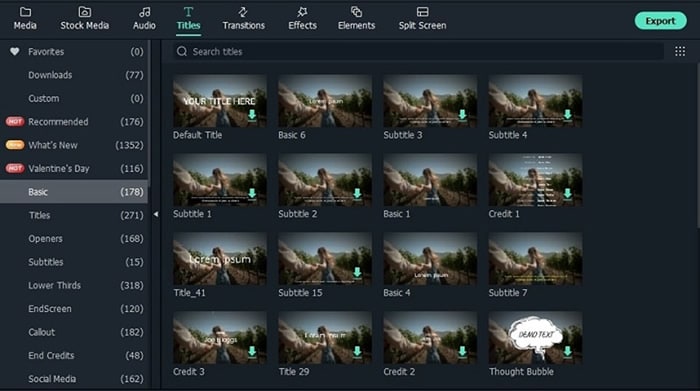
Step9 To add sound effects, go to Media and acquire the new audio clip or effect to add. Go to Effects > choose Audio Effects. Download the sound effect you want to insert and drag it onto the clip in the timeline.
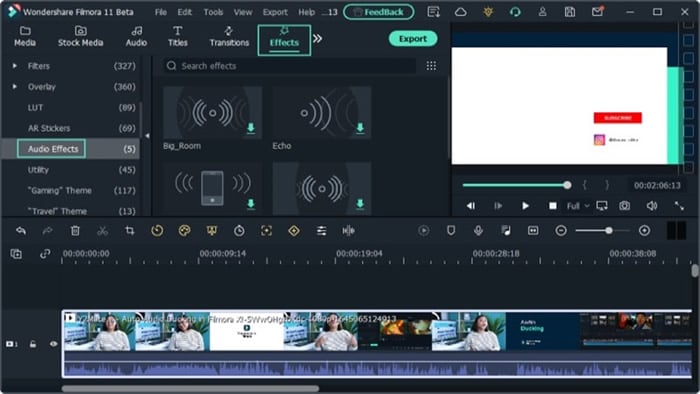
Step10 Choose sound effects like Echo, Small Room, Big Rooms, Lobby, etc. Download and drag the sound effect to the clip or press the Add icon. Play a preview to see how it worked.
Step11 After completing all the edits, click on the Export button at the top. In the next window, choose the file format and additional customizations through Settings. After everything is done, press the Export button to save offline.
Watch this video for a more detailed visual guide to podcast editing using Filmora.
2.YouTube Audio Library
One of the most user-friendly places online where you can find a wide range of high-quality sound effects is the YouTube Audio Library under YouTube Studio. Here, you can find genre-based sound effect choices useful for adding to YouTube videos. In terms of podcasting, you can also download the options offline and use them on your show.
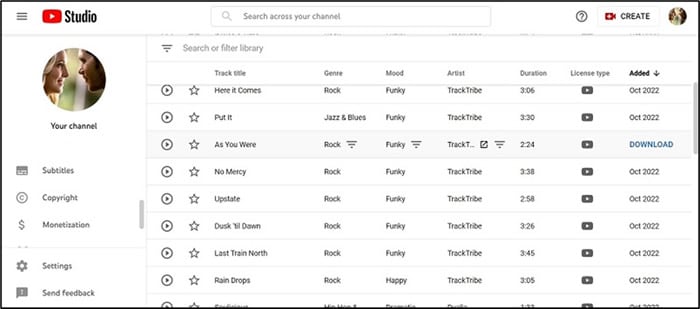
Price: Free
Features:
- Simple and fast downloading process.
- Clear and crisp sound quality.
- Various sizes of sound effects.
- Well-organized UI with liked songs under the starred section for easier access.
Pros
- Easy to browse through diverse sound effects.
- Directly filter the sound effect options by different components like length or genre to select.
- Directly search for sound clips with relevant keywords.
Cons
- You need to have a YouTube Studio account to get access to multiple free sound effects.
- Mainly for YouTube users.
3.Podcastle
Another top-level for podcasters for podcast effects is Podcastle. With this software, you can get AI support for intuitive editing of your episodes and even easily record interviews with up to 10 different speakers. Then, easily combine the different tracks with the editor here and add transition sound effects for optimized sound enhancement.
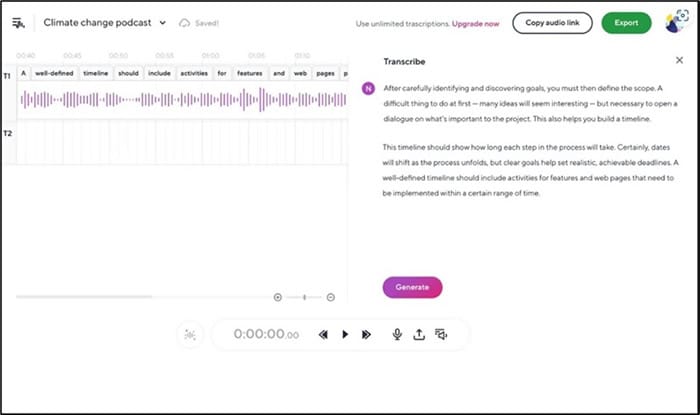
Price: Basic- Free, Storyteller- USD 3 per month, Pro- USD 8 per month
Features:
- Enhance speed in podcasts.
- AI features automatically remove broken sounds, unwanted noise, or silent parts.
- Use voice skins for text-to-speech benefits.
- Record your voiceover directly through this one platform.
Pros
- Royalty-free sound effects and music are available.
- Multi-track editing.
- Remoted interviewing benefits with the AI-powered app.
Cons
- Sound quality is not the best for free plan users.
- You have to upgrade to paid plans for more extensive free sound effects and music.
4.Freesound
If you want good free sound effects options, this is one of the oldest but most useful websites to trust for good-quality packs. The creators also edit and post their sound effects packs, which you can access easily. However, the learning curve of this site is slightly complicated, and it will take some time to learn how it works well.
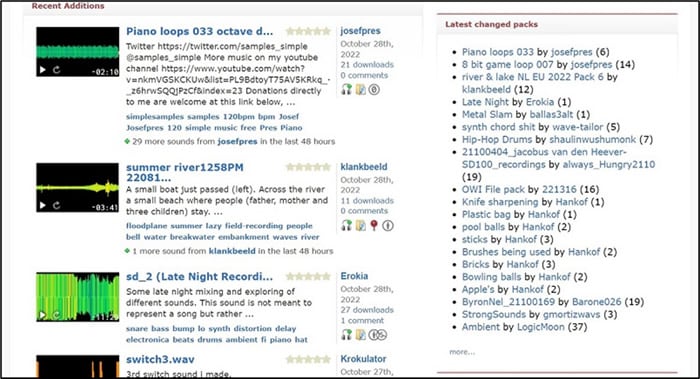
Price: Free
Features:
- The information is available to explain the sound packs.
- Various types of sound effects are available.
- Read comments and participate in forums with other creators.
- Register and download different packs of sound effects.
Pros
- Generate a random sound effect.
- Easily find sound effects packages from the list.
- Find song clips and effects via tags.
Cons
- Hard to navigate in the confusing interface.
- Strict licensing regulations are in place.
5.SoundBible
Another top-grade platform for sound effects that many podcasters trust is SoundBible. There are many types of suitable packs available that visitors can open and download. Previewing the sound effects first before downloading is easy to avoid choosing the wrong one.
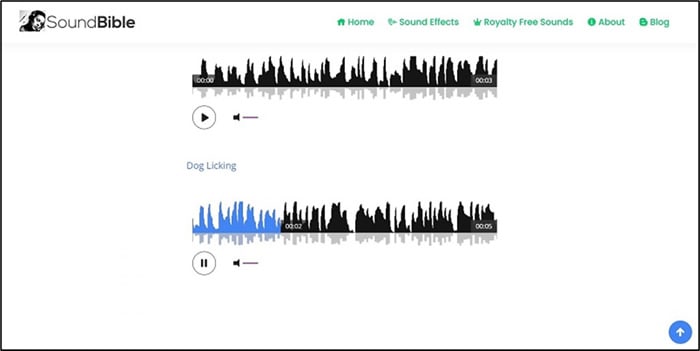
Price: Free
Features:
- Various styles of sound packs are available.
- Many royalty-free music options are available.
- Preview the sound clips before downloading.
- Fast downloading process.
Pros
- Download packs of sound effects based on type.
- Browse sound effects by tags or categories.
- Download sound effects in WAV and MP3 formats.
Cons
- Limited variety of options.
- Not the easiest browsing process to find relevant sound effects if you want genre-based choices.
6.Storyblocks
While trying out different apps and sites for dynamic music effect options, you should also give Storyblocks a chance. The platform offers different types of sound effects in its unlimited library. It is easy to search for them and preview the sound effect in your content with this app as well.
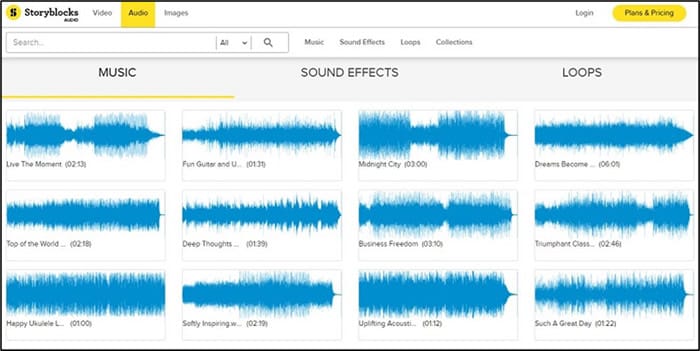
Price: Starter- USD 12.14 per month, Unlimited All Access- USD 24.29 per month, Pro- USD 29.35 per month
Features:
- Simple audio editor available.
- Preview what effects you will use and how they will work.
- Optimize sound quality and enhance sound.
- Get new content to choose from monthly.
Pros
- Fully stocked library of royalty-free sound clips.
- Diverse sound effects to choose from.
- Easily search for the type of effect you want to use in the app.
Cons
- No free version.
- Sound effects are available under higher-priced Pro and Unlimited All Access plans.
7.Music Radio Creative
If you want creative and customized voiceovers and intros for your podcast show, you will find many options in Music Radio Creative. Top creators, DJs, and music producers have created and distributed a variety of jingles and effects for users to try out and use for their podcasts. Plus, you will get AI-powered voiceover choices as well.
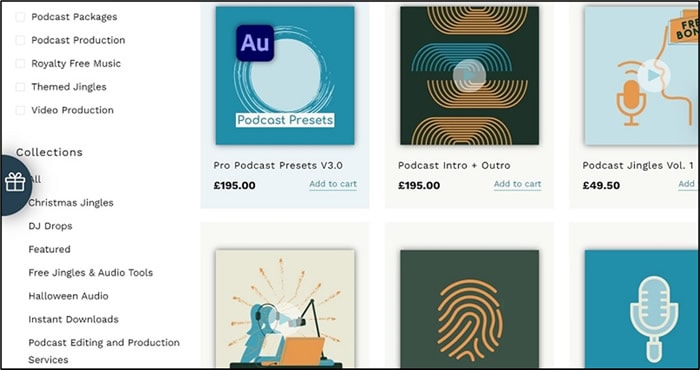
Price: Priced collections start at USD 40.
Features:
- Special offers for sound clips and effects.
- Different intro options for podcasts.
- Get themed jingles and effects.
- Collections of different theme-based options are available.
Pros
- Pre-made jingles are available for download.
- Free sound effects for different podcast styles.
- Pre-made voiceover choices.
Cons
- Very costly for complete beginners.
- Requires a strong and stable internet connection to download clips.
8.ZapSplat
Another user-friendly platform to try for free podcast sound effects is ZapSplat. The platform includes a wide range of sound effects you can hear and choose for your podcast episodes. The downloading process is simple, and you will get the final files in two commonly accessible audio formats for offline use.
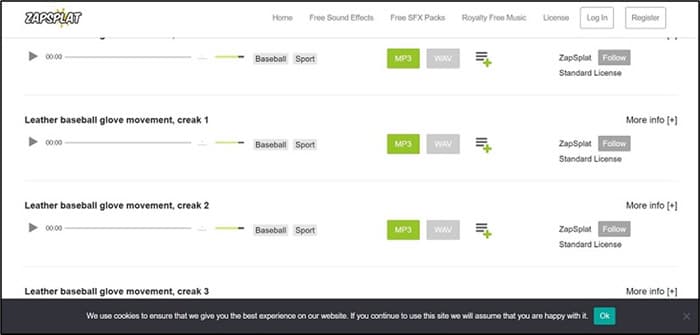
Price: Free
Features:
- Free sound effects for podcasts, recording and streaming.
- A categorized genre of different sound effect types.
- Download files in MP3 or WAV format.
- Preview the sound before downloading.
Pros
- Countless free sound effects.
- Many SFX options are available for free access.
- Well-organized list of sound effects for easier access and download.
Cons
- Sound effects of using here are only allowed for production-based usage.
- You cannot access and enable sound effects on the recorded files on other platforms.
9.Pixabay
If you want a straightforward user experience while choosing free sound effects for your podcast, Pixabay is a good choice. You will find different types of categorized sound effects, many of which are license-free. So, you can use them without worries of plagiarism in your content.
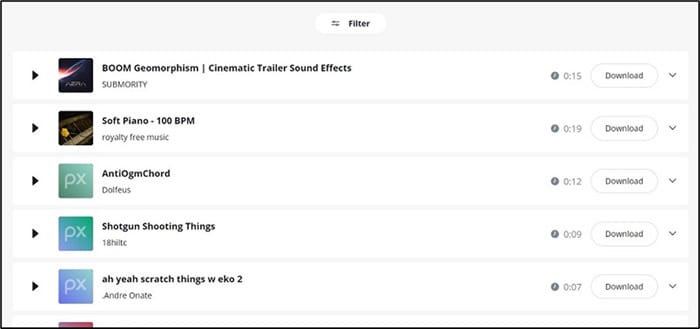
Price: Free
Features:
- Users can leave or read comments.
- Easily loads a new batch of royalty-free sound effects.
- Multiple genre options are available.
- Easy downloading process.
Pros
- Bookmark those you will download.
- Browse by tags.
- Play the sound effects to choose from.
Cons
- Need to register to get licensed content.
- Prompts appear after each download to promote the site.
10.Epidemic Sound
Another top-notch platform where you can find the best podcast transition sound effects is Epidemic Sound. This website has multiple styles of quality thematic and unique sound effects for users to try out. While the website is not free to use, you can easily find the best-quality sound effects for podcasts and publish them without hassle.
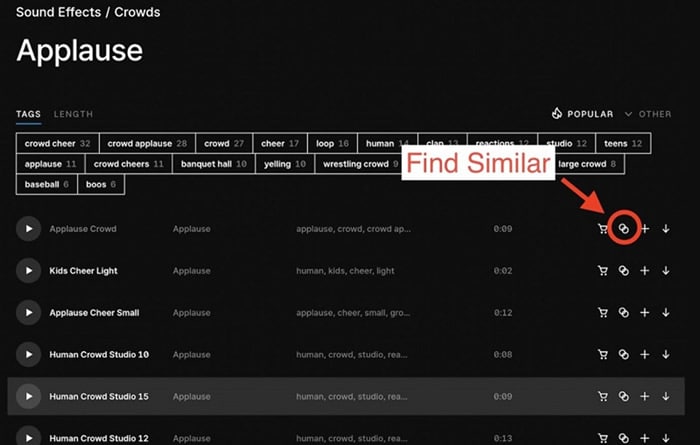
Price: Personal- USD 6/month, Commercial- USD 12/month, Enterprise- quoted cost from the brand.
Features:
- Monetize content across different social media platforms.
- Free trial of all features for 30 days.
- Easily publish your content on different sites.
- Thirty-five thousand track choices are available.
Pros
- Get 90,000 different sound effects to choose from.
- Get an unlimited number of downloads.
- Fast selection and downloading process.
Cons
- Support for music curation only for Enterprise plan users.
- The free first month is unavailable for enterprises or professionals using the biggest price plan.
11.Artlist
Another worthy option to trust for high-quality podcast sounds effects is Artlist. Users find it relatively simple to use this software to find different sound effects that will work for their podcast show theme. Plus, the website updates with new options daily, so you will not run out of options.
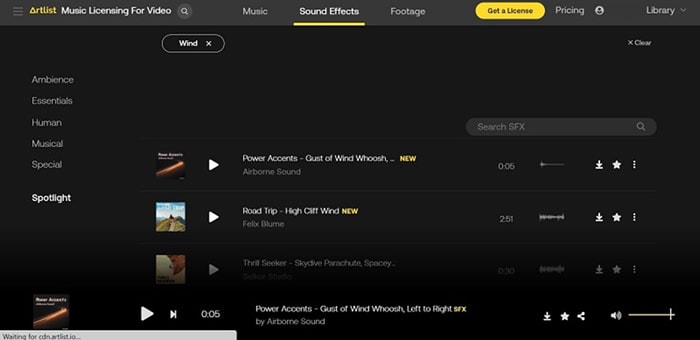
Price: Social Creator- USD 9.90/month, Creator Pro- USD 16.60/month, Enterprise- quoted cost, Team- USD 28.20/month
Features:
- Get new tracks and sound effects per day.
- The Pro license for users has a lifetime guarantee.
- Users can opt for customized pricing plans with customer team support.
- Diverse watermarked content is available for free plan users.
Pros
- Free sound effects licensed for different social media platforms.
- Podcast sound effects for free download under the Creator Pro plan.
- No copyright issues with the sound effects and music available for download here.
Cons
- Not possible to use the downloaded assets in multiple projects.
- Canceling the subscription and getting a refund are not available after 14 if you already downloaded the SFX options.
Free Download For Win 7 or later(64-bit)
Free Download For macOS 10.14 or later
Create Your Sound Effects As Last Resort
You will get different types of sound effects through the software and sites mentioned in this post. But do you want something different and more customized to your personal preferences for your podcast? The best solution, in that case, it to create your podcast sound effects.
The process will take a longer time. However, you will get a full license over the sound effects and save costs. Before doing so, you should research different content on creating podcast sound effects and add elements like echo effects online. Then, start the process.
Final Words
Different platforms are available for high-quality sound effects for podcast shows. You can use them to access countless free options or even prepare your own. However, if you want an overall high-grade user experience with one platform to record the podcast and add unique sound effects, Filmora is the best option for you.
Free Download For macOS 10.14 or later
Users can utilize Filmora to further enhance the sound quality using audio editing features like Denoise and Equalizer. Remove long silent parts with the Silence Detection mechanism, and sync the beats with voiceover using Auto Beat Sync. Plus, it has a simple UI with drag-and-drop functionality for an easier method of adding effects to specific sections.
Top Features to Try for Podcasters on Filmora:
- Optimize sound quality with audio editing tools like silence detection, audio synchronization, etc.
- Make your narration clear-sounding using the one-click Audio Ducking feature.
- Add AI-made voiceover if you want to avoid using your voice by adding text into the Text-to-Speech feature, which produces accurate voice narration.
- Utilize Speech-to-Text to transcribe your speech into text format in different languages, and add subtitles for your global listeners to read if you add a video version.
How to add Sound and Edit your Voiceovers for Podcasts with Filmora?
Step1 Download and launch the Wondershare Filmora 11 software on your PC or Mac device.
Step2 Plug a stable microphone you will use on the computer when you start. For the best voice quality during recording, it is best to utilize a high-grade external microphone model for professional-level sound capture.
Step3 Access the Filmora software after you launch it beforehand. On the homepage, click on the New Project option.
Step4 When the editor program opens, tap on the drop-down menu below the top-most toolbar for Record. From the options, select the “Record a Voiceover” choice.

Step5 The recording pop-up window will open. Click on the big red record button after the input microphone/speaker settings, and start speaking. When you are done, click the square red stop button. Press OK to save.
Alternatively, you can click on the Microphone icon. Please wait 3 seconds and then start speaking into the microphone and click it again after you are done speaking. The newly recorded file will automatically come in the audio track timeline.
Step6 Click the audio track in the timeline. Among the settings, make changes as you prefer in Pitch, Volume, and Speed. Cut the sections of your voiceover recording you want to remove and add fade-in/fade-out effects. After making all changes, click OK.

Step7 If you have the recording of the narration already available in other locations, like your phone or device, import it into the software.
Step8 Add transitions, effects, and titles from the respective tabs on the top toolbar.

Step9 To add sound effects, go to Media and acquire the new audio clip or effect to add. Go to Effects > choose Audio Effects. Download the sound effect you want to insert and drag it onto the clip in the timeline.

Step10 Choose sound effects like Echo, Small Room, Big Rooms, Lobby, etc. Download and drag the sound effect to the clip or press the Add icon. Play a preview to see how it worked.
Step11 After completing all the edits, click on the Export button at the top. In the next window, choose the file format and additional customizations through Settings. After everything is done, press the Export button to save offline.
Watch this video for a more detailed visual guide to podcast editing using Filmora.
2.YouTube Audio Library
One of the most user-friendly places online where you can find a wide range of high-quality sound effects is the YouTube Audio Library under YouTube Studio. Here, you can find genre-based sound effect choices useful for adding to YouTube videos. In terms of podcasting, you can also download the options offline and use them on your show.

Price: Free
Features:
- Simple and fast downloading process.
- Clear and crisp sound quality.
- Various sizes of sound effects.
- Well-organized UI with liked songs under the starred section for easier access.
Pros
- Easy to browse through diverse sound effects.
- Directly filter the sound effect options by different components like length or genre to select.
- Directly search for sound clips with relevant keywords.
Cons
- You need to have a YouTube Studio account to get access to multiple free sound effects.
- Mainly for YouTube users.
3.Podcastle
Another top-level for podcasters for podcast effects is Podcastle. With this software, you can get AI support for intuitive editing of your episodes and even easily record interviews with up to 10 different speakers. Then, easily combine the different tracks with the editor here and add transition sound effects for optimized sound enhancement.

Price: Basic- Free, Storyteller- USD 3 per month, Pro- USD 8 per month
Features:
- Enhance speed in podcasts.
- AI features automatically remove broken sounds, unwanted noise, or silent parts.
- Use voice skins for text-to-speech benefits.
- Record your voiceover directly through this one platform.
Pros
- Royalty-free sound effects and music are available.
- Multi-track editing.
- Remoted interviewing benefits with the AI-powered app.
Cons
- Sound quality is not the best for free plan users.
- You have to upgrade to paid plans for more extensive free sound effects and music.
4.Freesound
If you want good free sound effects options, this is one of the oldest but most useful websites to trust for good-quality packs. The creators also edit and post their sound effects packs, which you can access easily. However, the learning curve of this site is slightly complicated, and it will take some time to learn how it works well.

Price: Free
Features:
- The information is available to explain the sound packs.
- Various types of sound effects are available.
- Read comments and participate in forums with other creators.
- Register and download different packs of sound effects.
Pros
- Generate a random sound effect.
- Easily find sound effects packages from the list.
- Find song clips and effects via tags.
Cons
- Hard to navigate in the confusing interface.
- Strict licensing regulations are in place.
5.SoundBible
Another top-grade platform for sound effects that many podcasters trust is SoundBible. There are many types of suitable packs available that visitors can open and download. Previewing the sound effects first before downloading is easy to avoid choosing the wrong one.

Price: Free
Features:
- Various styles of sound packs are available.
- Many royalty-free music options are available.
- Preview the sound clips before downloading.
- Fast downloading process.
Pros
- Download packs of sound effects based on type.
- Browse sound effects by tags or categories.
- Download sound effects in WAV and MP3 formats.
Cons
- Limited variety of options.
- Not the easiest browsing process to find relevant sound effects if you want genre-based choices.
6.Storyblocks
While trying out different apps and sites for dynamic music effect options, you should also give Storyblocks a chance. The platform offers different types of sound effects in its unlimited library. It is easy to search for them and preview the sound effect in your content with this app as well.

Price: Starter- USD 12.14 per month, Unlimited All Access- USD 24.29 per month, Pro- USD 29.35 per month
Features:
- Simple audio editor available.
- Preview what effects you will use and how they will work.
- Optimize sound quality and enhance sound.
- Get new content to choose from monthly.
Pros
- Fully stocked library of royalty-free sound clips.
- Diverse sound effects to choose from.
- Easily search for the type of effect you want to use in the app.
Cons
- No free version.
- Sound effects are available under higher-priced Pro and Unlimited All Access plans.
7.Music Radio Creative
If you want creative and customized voiceovers and intros for your podcast show, you will find many options in Music Radio Creative. Top creators, DJs, and music producers have created and distributed a variety of jingles and effects for users to try out and use for their podcasts. Plus, you will get AI-powered voiceover choices as well.

Price: Priced collections start at USD 40.
Features:
- Special offers for sound clips and effects.
- Different intro options for podcasts.
- Get themed jingles and effects.
- Collections of different theme-based options are available.
Pros
- Pre-made jingles are available for download.
- Free sound effects for different podcast styles.
- Pre-made voiceover choices.
Cons
- Very costly for complete beginners.
- Requires a strong and stable internet connection to download clips.
8.ZapSplat
Another user-friendly platform to try for free podcast sound effects is ZapSplat. The platform includes a wide range of sound effects you can hear and choose for your podcast episodes. The downloading process is simple, and you will get the final files in two commonly accessible audio formats for offline use.

Price: Free
Features:
- Free sound effects for podcasts, recording and streaming.
- A categorized genre of different sound effect types.
- Download files in MP3 or WAV format.
- Preview the sound before downloading.
Pros
- Countless free sound effects.
- Many SFX options are available for free access.
- Well-organized list of sound effects for easier access and download.
Cons
- Sound effects of using here are only allowed for production-based usage.
- You cannot access and enable sound effects on the recorded files on other platforms.
9.Pixabay
If you want a straightforward user experience while choosing free sound effects for your podcast, Pixabay is a good choice. You will find different types of categorized sound effects, many of which are license-free. So, you can use them without worries of plagiarism in your content.

Price: Free
Features:
- Users can leave or read comments.
- Easily loads a new batch of royalty-free sound effects.
- Multiple genre options are available.
- Easy downloading process.
Pros
- Bookmark those you will download.
- Browse by tags.
- Play the sound effects to choose from.
Cons
- Need to register to get licensed content.
- Prompts appear after each download to promote the site.
10.Epidemic Sound
Another top-notch platform where you can find the best podcast transition sound effects is Epidemic Sound. This website has multiple styles of quality thematic and unique sound effects for users to try out. While the website is not free to use, you can easily find the best-quality sound effects for podcasts and publish them without hassle.

Price: Personal- USD 6/month, Commercial- USD 12/month, Enterprise- quoted cost from the brand.
Features:
- Monetize content across different social media platforms.
- Free trial of all features for 30 days.
- Easily publish your content on different sites.
- Thirty-five thousand track choices are available.
Pros
- Get 90,000 different sound effects to choose from.
- Get an unlimited number of downloads.
- Fast selection and downloading process.
Cons
- Support for music curation only for Enterprise plan users.
- The free first month is unavailable for enterprises or professionals using the biggest price plan.
11.Artlist
Another worthy option to trust for high-quality podcast sounds effects is Artlist. Users find it relatively simple to use this software to find different sound effects that will work for their podcast show theme. Plus, the website updates with new options daily, so you will not run out of options.

Price: Social Creator- USD 9.90/month, Creator Pro- USD 16.60/month, Enterprise- quoted cost, Team- USD 28.20/month
Features:
- Get new tracks and sound effects per day.
- The Pro license for users has a lifetime guarantee.
- Users can opt for customized pricing plans with customer team support.
- Diverse watermarked content is available for free plan users.
Pros
- Free sound effects licensed for different social media platforms.
- Podcast sound effects for free download under the Creator Pro plan.
- No copyright issues with the sound effects and music available for download here.
Cons
- Not possible to use the downloaded assets in multiple projects.
- Canceling the subscription and getting a refund are not available after 14 if you already downloaded the SFX options.
Free Download For Win 7 or later(64-bit)
Free Download For macOS 10.14 or later
Create Your Sound Effects As Last Resort
You will get different types of sound effects through the software and sites mentioned in this post. But do you want something different and more customized to your personal preferences for your podcast? The best solution, in that case, it to create your podcast sound effects.
The process will take a longer time. However, you will get a full license over the sound effects and save costs. Before doing so, you should research different content on creating podcast sound effects and add elements like echo effects online. Then, start the process.
Final Words
Different platforms are available for high-quality sound effects for podcast shows. You can use them to access countless free options or even prepare your own. However, if you want an overall high-grade user experience with one platform to record the podcast and add unique sound effects, Filmora is the best option for you.
Also read:
- Updated Adobe Audition Expertise Eliminating Unwanted Sounds and Noise
- New In 2024, Techniques for Maintaining Audio Fidelity During Pitch Alteration with Audacity
- Updated The Leading Online Music Production Platforms Reviewed – Compare Free & Subscription-Based Services
- New 2024 Approved The Art of Synchronized Streams Implementing Smooth Volume Level Changes Using OBS
- New Premier Audio Narrators Discovering the Best Tools for Your Projects for 2024
- Updated Techniques for Sound Isolation Preventing Noise Contamination in Audio Capture for 2024
- Updated In 2024, The Ultimate Step-by-Step Process for Transforming Videos Through Dubbing Using Filmora
- Updated 2024 Approved Crafting Auditory Landscapes The Artistic Synergy Between Film Edits and Pianissimo Passages
- Updated In 2024, What Every Sound Engineer Should Know About TwistedWave
- Updated 2024 Approved Mastering the Aesthetics of Audio Design Examining Features, Benefits, Drawbacks, and Comparisons with Alternatives
- Unveiling the Best Music Production Software How Does MAGIX Samplitude Stack Up for 2024
- New Ultimate Index of Podcast Syndication Directories
- In 2024, The Premier Selection 6 Excellent Voice Alteration Apps for Smartphones
- Visually Captivating A Comprehensive Strategy to Enthrall Listeners with Podcast Covers
- Updated Advanced Software Options for Distilling Pure Auditory Experiences
- 8 Best Voice Recognition Software for Windows, Mac and Online
- In 2024, Streamline Your Music Library with These Top 5 Internet MP3 Editors
- 2024 Approved Expert Techniques for Audio Track Replacement in Multimedia Files
- Updated Revolutionize Phone Calls with These 6 Premier Voice-Altering Apps for Android & iOS Devices
- Top-Tier AE Templates for Poetic Visual Storytelling
- 2024 Approved Echoes of Innovation Uncovering the Top 8 Digital Hubs for Comprehensive Free Sound Effect Collections (For Todays Creators)
- Essential Listings for Authentic Copyright-Free Comic Audio Music Streams for 2024
- Mastering Volume Transitions Audio Panning Techniques in iMovie
- The Filmmakers Toolkit for Perfect Timing and Volume Control Mastery of Audio Ducking in Filmora
- Unveiling the Secrets of Vimeo Videos Exploring Aspect Ratio Options for 2024
- New In 2024, Achieving Smooth Transitions Utilizing Audio Ducking for Elegant Music Fades in PowerDirector
- New In 2024, Unleashing the Power of Sound 15 Undeniable Rock Tunes From 2023
- New A Step-by-Step Guide to Crafting Professional-Level Android Media With Audio Integration
- New 5 Premier Free Tools for Enhancing Your Vocal Range
- Locating High-Quality Sounds of Onomatopoeic Klaps for 2024
- Pinpointing the Top 8 AI-Driven Voice Processors for Windows, Mac, and Online Services for 2024
- New The Ultimate List of High-Quality Instant Speech Transformers for 2024
- New Trace Acoustic Expressions Linked to Painting Devices
- Updated In 2024, Melodies in Motion Curating a List of Audiovisual Wonders for Music Lovers (Free and Paid)
- Updated 2024 Approved Discover the 6 Premier Free Online Music Editors
- Updated In 2024, Podcast Editing 101 How to Edit a Podcasta Beginners Guide
- New In 2024, The Ultimate Guide to Integrating Audacity Into Your Ubuntu Workflow - From Installation to Uninstallation
- New Voice Variation Ventures 10 Novel Approaches to Infuse Joy Into Phone Conversations
- New 2024 Approved Premium Pop Harmony Selections The Best Sounds for Video Scenes
- In 2024, Transform Your Videos with 3D Effects A Windows Users Guide
- A Step-by-Step Guide to Finding Your Apple ID On Your Apple iPhone X
- Pokemon Go No GPS Signal? Heres Every Possible Solution On Samsung Galaxy A14 5G | Dr.fone
- How to Downgrade Apple iPhone 6 to an Older iOS System Version? | Dr.fone
- Recover Apple iPhone 13 Pro Data From iOS iTunes | Dr.fone
- Updated 4K/8K Video Editing Showdown Top Software Compared
- In 2024, Top 9 Samsung Galaxy S23 Ultra Monitoring Apps for Parental Controls | Dr.fone
- New In 2024, 10 Best Websites to Discover Free Premiere Pro Video Templates
- Thinking About Changing Your Netflix Region Without a VPN On Oppo A78? | Dr.fone
- How to Repair corrupt MP4 and MOV files of Motorola Razr 40?
- Easily Create Stunning Home DVDs with the Best Video Editing Tools for 2024
- Updated Unify Your Visual Style Color Matching Techniques for PowerDirector
- Vivo Bypass Tools to Bypass Lock Screen(Vivo S17 Pro)
- How to Unlock Itel P55 Bootloader Easily
- Complete Guide on Unlocking iPhone 14 with a Broken Screen?
- In 2024, Top 5 Tracking Apps to Track Lava Yuva 3 without Them Knowing | Dr.fone
- In 2024, Top 5 Tools to Convert Text to Audio Online for Free
- In 2024, How to Change/Fake Your Huawei Nova Y91 Location on Viber | Dr.fone
- In 2024, How to Reset Gmail Password on Vivo Y200 Devices
- Updated In 2024, Transform Your Footage Expert Techniques for Creating Breathtaking Movies
- In 2024, Mastering Lock Screen Settings How to Enable and Disable on Poco F5 Pro 5G
- How to Exit Android Factory Mode On Tecno Spark 20C? | Dr.fone
- How To Revive Your Bricked Tecno Pova 5 in Minutes | Dr.fone
- How To Unlock SIM Cards Of Oppo Reno 10 5G Without PUK Codes
- How to Remove Forgotten PIN Of Your Samsung Galaxy A24
- New In 2024, The Ultimate Guide to Smoothening Out Your Videos in Adobe Premiere Pro
- How to Access Your iPhone 12 When You Forget the Passcode?
- How To Transfer Data From iPhone 14 Pro To Other iPhone 11 Pro devices? | Dr.fone
- New Free Video Cutting Tools for MP4 Expert-Approved Options
- New Transforming Videos Into Immersive Experiences Top VR Converters
- My Videos Arent Playing on HTC U23 Pro – What Can I Do? | Dr.fone
- New 2024 Approved Free Sound Effects for Video Editing A Comprehensive Guide for Final Cut Pro Users
- New In 2024, From Clips to Masterpiece Essential Video Editing Techniques
- Which Pokémon can Evolve with a Moon Stone For Poco C51? | Dr.fone
- Title: In 2024, Streamlining Audio Success Leading Podcast Hosting Options
- Author: Jacob
- Created at : 2024-05-20 00:04:25
- Updated at : 2024-05-21 00:04:25
- Link: https://audio-shaping.techidaily.com/in-2024-streamlining-audio-success-leading-podcast-hosting-options/
- License: This work is licensed under CC BY-NC-SA 4.0.

